BEYOND THE BOARDROOM
Trustees gain insights through campus visits

Homegrown Leader
TASB President brings strong voice to new role
Q&A: Teen Safety
Ambassadors
Building Leaders Through Student Voice

Trustees gain insights through campus visits

TASB President brings strong voice to new role
Q&A: Teen Safety
Ambassadors
Building Leaders Through Student Voice

TASB Officers 2025-26
Tony Hopkins, President, Friendswood ISD
Mary Jane Hetrick, President-Elect, Dripping Springs ISD
Dan Micciche, First Vice President, Dallas ISD, Region 10C
Sylvia Sánchez Garza, Second Vice President, South Texas ISD, Region 1B
Justin Chapa, Secretary-Treasurer, Arlington ISD, Region 11C
Rolinda Schmidt, Immediate Past President, Kerrville ISD
TASB Board of Directors 2025-26
Moises Alfaro, Mathis ISD, Region 2
Rose Avalos, Aldine ISD, Region 4A
Carlos Bentancourt, Slaton ISD, Region 17
Lynn Boswell, Austin ISD, Region 13A
Darlene Breaux, Alief ISD, Region 4B
Steve Brown, Ector County ISD, Region 18
Marlene Bullard, Tornillo ISD, Region 19
Kevin A. Carbó, Mesquite ISD, Region 10D
Crystal Carbone, Pearland ISD, Region 4C
Julie Cole, Hurst-Euless-Bedford ISD, Region 11A
Thomas Darden, Cooper ISD, Region 8
Dynette Davis, Frisco ISD, Region 10E
Angela Lemond Flowers, Houston ISD, Region 4D
Rebecca Fox, Katy ISD, Region 4E
Ginger Friesenhahn, East Central ISD, Region 20A
Angie Hanan, Fort Bend ISD, Region 4G
Carol Harle, Northside ISD-Bexar County, Region 20B
Regina Harris, Richardson ISD, Region 10B
Bryan Holubec, Thrall ISD, Region 13C
Elizabeth Ivey, Montgomery ISD, Region 6A
Todd LeCompte, Cypress-Fairbanks ISD, Region 4F
Mark Lukert, Wichita Falls ISD, Region 9
Raymond P. Meza, San Felipe Del Rio CISD, Region 15
James Morton, ESC 8, ESC Representative
Steven Newcom, Eagle Mountain-Saginaw ISD, Region 11D
Nicholas Phillips, Nederland ISD, Region 5
Quinton “Q” Phillips, Fort Worth ISD, Region 11B
Margaret Pruett, Victoria ISD, Region 3
Tony Raymond, Sabine ISD, Region 7
Keri Roberts, Goldthwaite CISD, Region 12
Alison Busse Savage, Lyford CISD, Region 1A
Robert Selders Jr., Garland ISD, Region 10A
Rich Sena, Boerne ISD, Region 20D
Cindy Spanel, Highland Park ISD-Potter County, Region 16
Greg Welch, Clyde CISD, Region 14
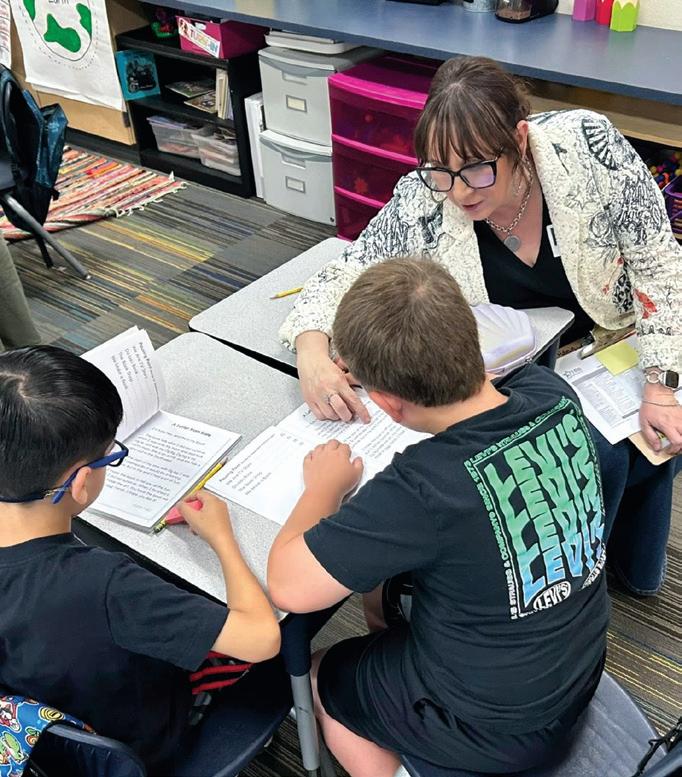
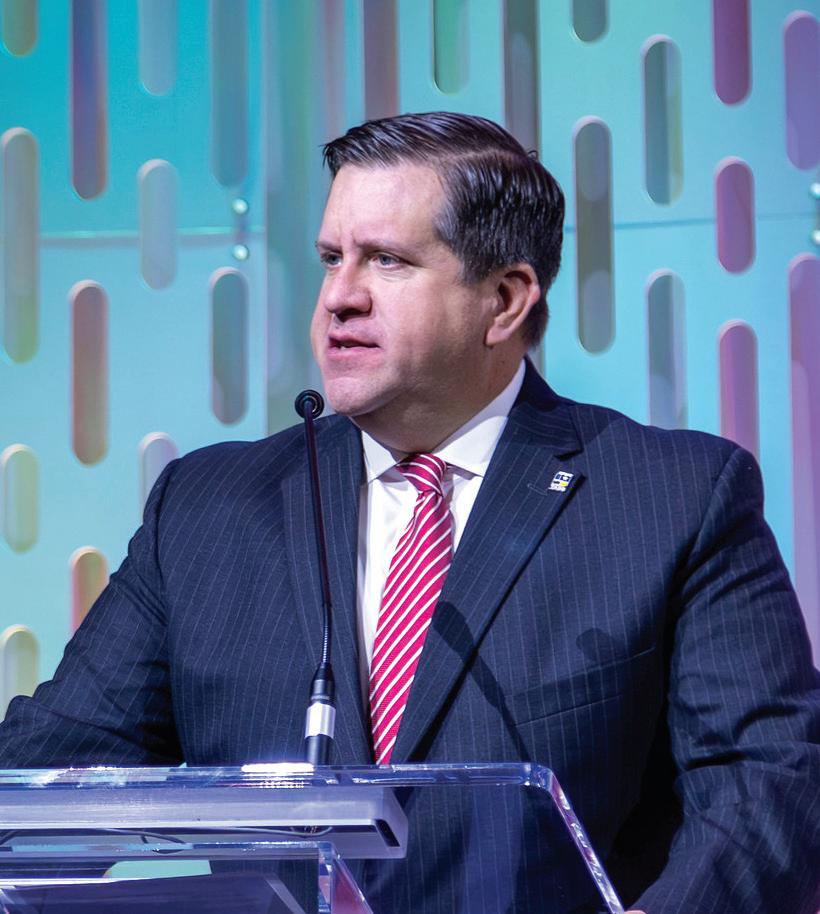
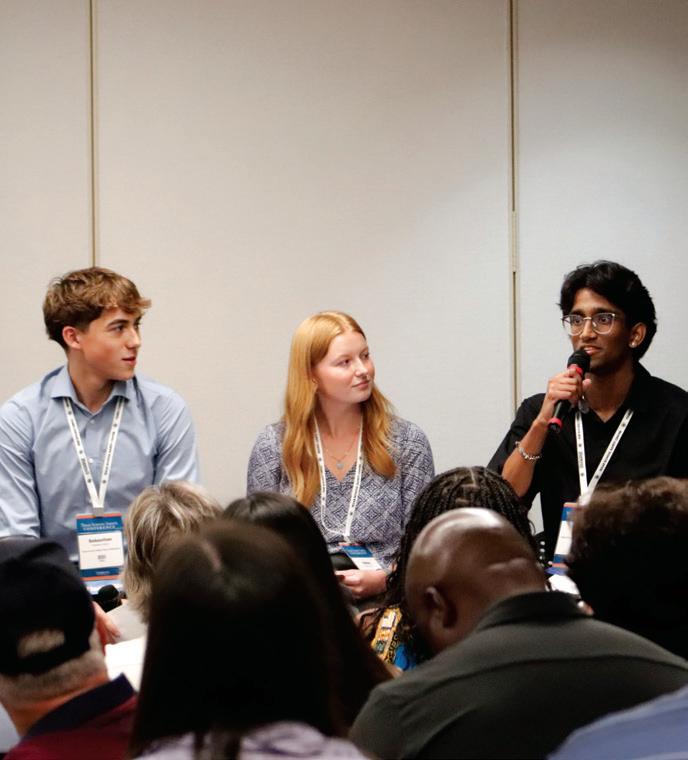
Building
Texas Lone Star • Volume 43, Number 5
Texas Association of School Boards
P.O. Box 400 • Austin, Texas • 78767-0400
512-467-0222 • 800-580-8272
Laura Tolley • Managing Editor
Shu-in Powell • Graphic Designer
Lalo Garcia • Photographer
Prisma • Printer
Contributors: Sara Butler, Theresa Gage-Dieringer, Beth Griesmer, Dax González, Robert Long III, Mary Ann Lopez, Matt Mitchell, Sylvia Wood
Cover design: Shu-in Powell
Texas Lone Star (ISSN 0749-9310) is published six times a year by the Texas Association of School Boards. Copyright© 2025 by the Texas Association of School Boards (TASB). All rights reserved. Reproduction, adaptation, distribution, and exhibition in whole or in part are prohibited under penalty of law without the written license or permission of TASB. Copies of Texas Lone Star are mailed to trustees of TASB member school boards and their superintendents as part of their membership. Subscriptions are available to nonmembers for $36 (1 year), $69 (2 years), and $99 (3 years). Single copies are $5.
Address changes should be sent to Michael Pennant, TASB, P.O. Box 400, Austin, Texas 78767-0400.
Articles in Texas Lone Star are expressions of the author or interviewee and do not represent the views or policies of TASB. Permission to reprint should be emailed to communications@tasb.org or addressed to the Managing Editor, P.O. Box 400, Austin, Texas 78767-0400.
Texas Lone Star does not guarantee publication of unsolicited manuscripts.
Postmaster: Send address changes to TASB, P.O. Box 400, Austin, Texas 78767-0400.




Join the movement. Share your public school pride. Tell your story. Be part of the reason Texas families choose public education — now and for the future.

by Tony Hopkins
My term as TASB President began at txEDCON, where those in attendance were profoundly impacted by the emotional presentation from Kerrville ISD.
How those district leaders and staff members responded to the deadly flooding in Kerr County reminded us all of the vital role public schools play in sustaining and strengthening our communities, particularly in times of tragedy. Schools are not only centers of learning — they are places of resilience, hope, and connection for the families they serve.
Like all of you, I am proud to have served my local community of Friendswood as a trustee for the last 17 years. In that time, I have seen firsthand that school districts are truly the heartbeat of our communities. Trustees are charged with protecting the value of public education and ensuring that it remains a foundation for opportunity.
My guiding principles
When I first ran for school board in 2008, I did so with two guiding principles that remain true today:
• Protect the district that gave me every opportunity to explore my interests and passions as a student and preserve those same opportunities for students today.
• Uphold my belief that public education is the great equalizer in American society. With a strong education and a commitment to hard work, I am convinced that any student can achieve the American dream.
Writer and philosopher G.K. Chesterton once observed, “Education is simply the soul of a society as it passes from one generation to another.” That simple but
profound statement captures the essence of our mission.
Education is not just about academic achievement; it is about shaping the values, aspirations, and character of our next generation. None of this happens in isolation. It happens because of the value of community — neighbors supporting neighbors, educators guiding students, and trustees stepping up to serve. When our communities rally around their schools, the entire state of Texas becomes stronger.
Voicing support for public ed
In Friendswood, I am best known as the “Voice of the Mustangs,” serving as the football announcer for the last 32 years. Over the past year, however, I also took on another role — traveling frequently to Austin to serve as a voice for school boards across the state.
One of the most important lessons I learned from those visits is that legislators prefer to hear directly from you, their local board members. Your experiences and your stories carry a weight that no statewide association can fully replicate. That is why building and sustaining strong relationships with your state representatives and senators is essential to protecting public education
As TASB moves forward, I am particularly proud of our new nonpartisan, member-focused strategic plan, which is designed to strengthen our ability to serve trustees and the districts they represent. I have spent the last two years leading this process, and I am convinced this plan ensures that our work remains centered on what matters most — supporting local school boards in their governance responsibilities while rising above the shifting winds of politics.
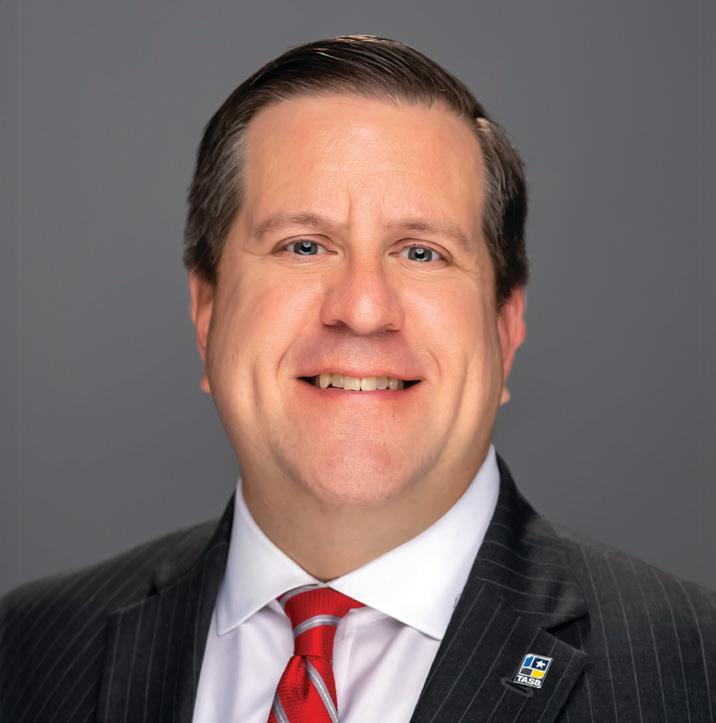
Through this effort, TASB is reinforcing its commitment to three essential priorities: delivering value-added services that save districts time and resources, promoting good governance that equips trustees to make effective decisions, and leading with a unified voice through public advocacy on behalf of Texas students. These areas of focus will ensure that TASB continues to provide meaningful support and measurable value to its members.
I want to invite every school board in Texas to take proactive steps in engaging your elected officials well before the 90th legislative session begins in January 2027. By building these relationships now, you will strengthen the credibility of your district’s voice and add to the collective influence of school boards across the state. Together — with the strength of our local communities, the services provided by TASB, and the clear direction outlined in our strategic plan — we will continue to protect and advance the value of public education in Texas.
Public schools remain one of the greatest investments we can make in the future of our state. They are where dreams are nurtured, opportunities are created, and the next generation of leaders is prepared. As trustees, we have the honor and responsibility to ensure that this legacy endures. With unity, vision, and community commitment, I am confident we will rise to meet that challenge.H
Tony Hopkins, Friendswood ISD’s board president, is the 2025-26 president of TASB.
Have a powerful story, strategy, or student initiative to share? Submit a session and help ignite the conversation with education leaders from across Texas.
Nov. 1, 2025 – Jan. 9, 2026
WILL BE OPEN JAN. 1-JAN 15, 2026
• Leadership & Governance Strategies that drive student success and elevate student voice
• Student Voice
Student-led sessions and demonstrations that spark creativity, leadership, and advocacy
To offer CEC credit, at least one presenter per session must be a TEA-registered provider. Their provider number will appear on official credit records for attendees.
by Laura Tolley
Attending txEDCON is kind of like experiencing a rousing football rally, an old-school political convention, and an intense training seminar all rolled up into one powerful event.
From the emotional and joyful student performances to the in-depth breakout sessions to the countless opportunities to connect with public school leaders from across Texas, the convention more than lives up to its promise of offerings: Ideas. Insights. Inspiration.
The annual gathering of trustees, superintendents, and other school leaders was held a bit earlier this year, and many folks had to travel a bit further since it was in Houston, but there was no lack of enthusiasm among participants.
Attendees crowded into breakout sessions and some lingered behind afterward to ask speakers additional questions. They talked about topics affecting public education in casual conversations throughout the George R. Brown Convention Center in downtown Houston. They listened intently to general session speakers.
Kevin Brown, the keynote speaker on the second day, discussed how heroes are extraordinary people choosing to not be ordinary. “Friends, you understand that we are all just a collection of stories,” Brown said. “We show up every single day of our life, and we pen a new chapter in the story of us. We help the people we serve — and serve with — pen a new chapter in story of their life.”
It’s inspiring to witness school leaders’ passion for and dedication to public schoolchildren across this state. Achieving student success comes in many forms, and txEDCON attendees were there to
learn more about how they can help their students, teachers, and staff.
“Having administrators and trustees learning together is special and meaningful,” Carlos Rios, superintendent of San Felipe Del Rio Consolidated ISD, told me just before the convention. Rios and the San Felipe Del Rio CISD board have attended nearly all of the annual conventions in his 13 years as superintendent.
To get the most out of the many learning opportunities at txEDCON, Rios said he typically asks his trustees in advance which breakout sessions they plan to attend. “Armed with this information, I schedule my breakout sessions to coincide with as many of our trustees’ choices as possible.” They learn together.
Rios said this year’s offerings regarding legislative actions were of particular importance to him and his team because so many significant bills relating to public education were passed.
Linda Guanajuato-Webb, a San Felipe Del Rio CISD trustee, said she attends the conference because it’s important for her to be informed on policies and educational changes. She has served San Felipe Del Rio CISD for more than 40 years in different positions: teacher, counselor, administrator, and director of bilingual and early childhood education. Currently, she is completing her eighth year as a board member.
“I am truly dedicated to student success and teacher retention with higher salaries,” she told me just before the Sept. 11-14 convention. “That being said, my main goal is to advocate for both students and teachers. This is done by being involved, being informed on policies and
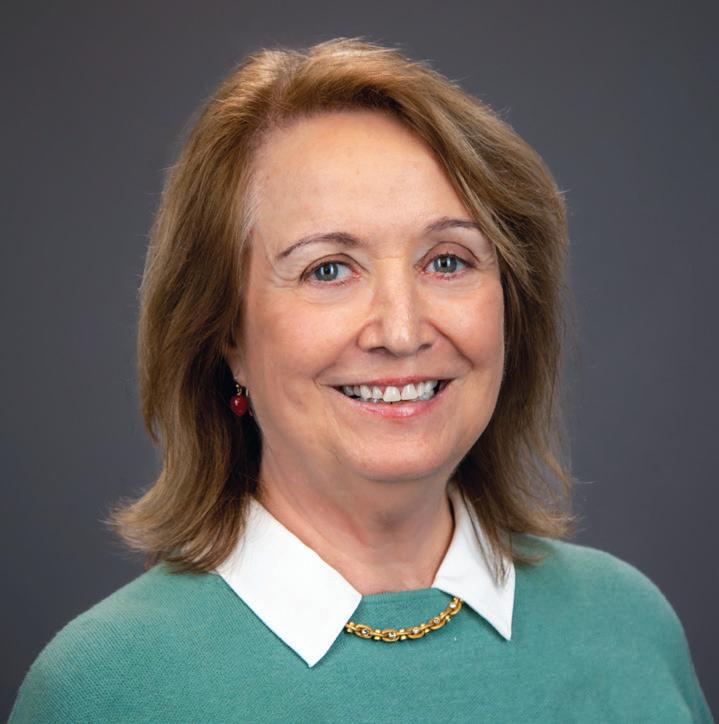
educational changes. Conferences like this allow trustees to network and gain knowledge in order to effectively advocate for our district’s needs.
“It is very important to attend conferences, network with other districts, and form strong bonds and partnerships if our students are to be successful,” she said.
So much news from txEDCON
I heard so many similar stories from those attending txEDCON. Each had their own unique story, but all were there to further their efforts to serve their students and districts.
Many of the articles in this issue are related to txEDCON activities. You can read about the Superintendent of the Year honoree and Colorado ISD’s board, which was named the 2025 Outstanding School Board by the Texas Association of School Administrators.
There’s also a profile of Tony Hopkins, who officially became the 2025-26 TASB President at Delegate Assembly, the Association’s annual meeting that’s held at txEDCON. Hopkins, Friendswood ISD’s board president, also pens his first column in this issue. Additionally, read about what happened at Delegate Assembly and meet the next Leadership TASB class.
We have all your txEDCON news and more in this issue. I hope you enjoy it.H

Trustees gain insights through campus visits

by Beth Griesmer

Trustees sitting in the TASB Summer Leadership Institute session in Fort Worth did not hide their skepticism. The idea being presented by the enthusiastic assistant superintendent from Snyder ISD was met with more than a few shaking heads, but they heard her out.
“We transformed board members’ understanding of what was actually happening in classrooms,” Jessica Gore, Snyder ISD assistant superintendent, explained to the roomful of school board members and superintendents.
In the West Texas district of 2,300 students, trustees join district and campus leaders in monthly scheduled visits to classrooms, where they observe lessons, interact with students, and gain insight into instructional strategies.
“This is pushing the envelope,” said Brad Hinton, president of the Snyder ISD board, referring to the school board’s governance role. “But I have seen the benefits of it.”
Snyder ISD has adopted instructional rounds, a practice that invites trustees to step into learning spaces, observe teaching in action, and connect with students and educators on a more personal level. Modeled after medical field
practices, instructional rounds, commonly called board walks, give leaders a clearer picture of how learning unfolds day to day.
“When I see things, I understand them,” Hinton said. “When I see it, it becomes real to me.”
Snyder ISD Superintendent Bob Rauch understood the hesitation among school leaders in the room when he presented at SLI in both San Antonio and Fort Worth with Gore, Hinton, and Valerie Morris, the district’s director of communications.
“I get it,” Rauch said. But he and his staff wanted to explain how they have found a way to engage their board members to help them work through decisions and support them with information for when they are out in the community.
“A lot of different stories were going around about campuses,” Rauch said. “As those concerns were brought to me [by individual trustees], I would scratch my head a little bit. I hear what they are saying, but when I walk the halls and go into classroom, I’m not seeing the same scenario as the stories that are being told out there.”
Rauch and his team decided a good way to better engage the board was through the

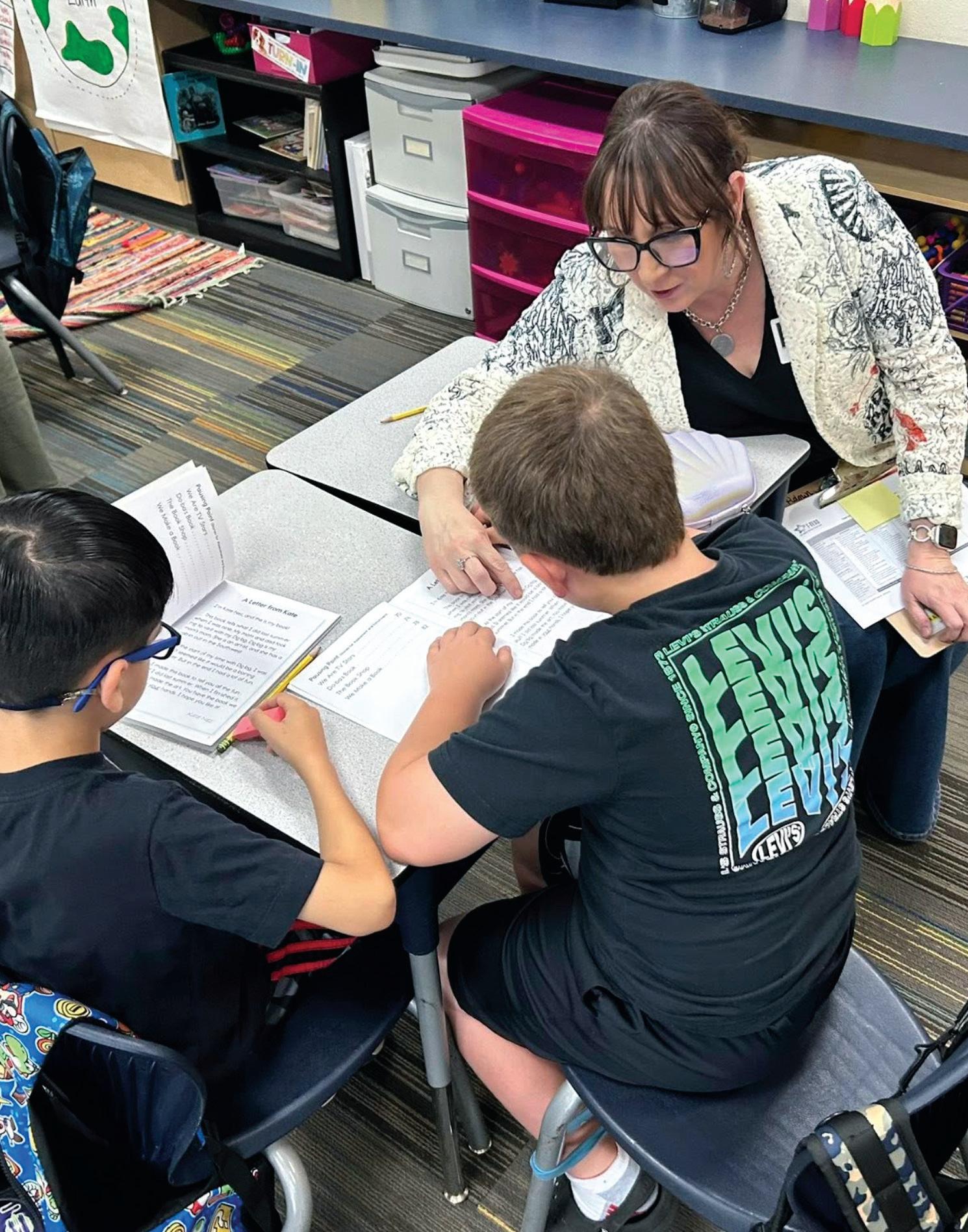
instructional round process so that trustee conversations in the community could be grounded in firsthand experiences from classrooms across the district.
“We needed to get them more involved in the instructional and academic processes and systems we utilize,” he said.
Both Rauch and Hinton know that this plan can cause some governance concerns about “staying in your lane.”
“When I first became a board member, I wanted to go check in on all the campuses and make sure everyone was doing the job they needed to be doing,” Hinton said. “Came to find out real quick that was not my job.”
Both agree that this process, launched about three years ago, builds trust and aligns districtwide strategies from the classroom to the boardroom — but it requires a delicate balance between oversight and management.
“Instructional rounds shift governance from compliancedriven oversight to informed, engaged leadership,” Rauch said.
There is a distinct method to this madness.
At the beginning of the school year, the administration is on campuses building relationships, which Gore said is key to making instructional rounds work. “We go out the first two weeks when teachers are hungry for help and just never leave.”
By covering classrooms and lunchrooms, greeting students as they arrive at school, and generally being on hand to assist wherever needed, the administration becomes a familiar presence in classrooms and hallways across the district.
This sets the stage for the monthly instructional rounds that are scheduled for the first Wednesday of the month throughout the school year. The process is structured but approachable. Rauch sends out a general invite to trustees who are available, being sure to keep the number who accept below the threshold for a quorum.
Each round begins with a brief meeting with the superintendent about what classrooms the group will visit and what instructional practices they might observe, providing context on the lesson focus, instructional strategies, and district goals. Trustees head out armed with clipboards holding a schedule for the day, a rubric on instructional practices for reference, and a stack of sticky notes.
Trustees, along with a few campus leaders and occasionally outside observers, then rotate through about 20 classrooms on multiple campuses, typically spending 5-10 minutes in each.
Hinton stresses that these visits are not staged and trustees might see anything and everything during a round.
“What is amazing to me is when a board member can walk in and out of these classes,” Hinton said, noting that insights and observations from a board walk have the potential to help inform decisions in the boardroom later, especially those related to programs and personnel. “It’s really powerful for board members to see the inside workings of a school system.”
Rauch noted that board members often don’t have an educational background and have to make difficult decisions. “It helps you to have eyes on what is going on in classrooms.”
Board walks help build trust when trustees have seen firsthand the agenda items that are being presented in meetings.
“We have enhanced governance when they understand the ‘why’ behind a proposal,” Gore said. “When we put something on the board agenda for action, it can’t be the first time they have seen it. They have to have seen the runway gearing up for a decision we are asking them to vote on as a team of seven.”
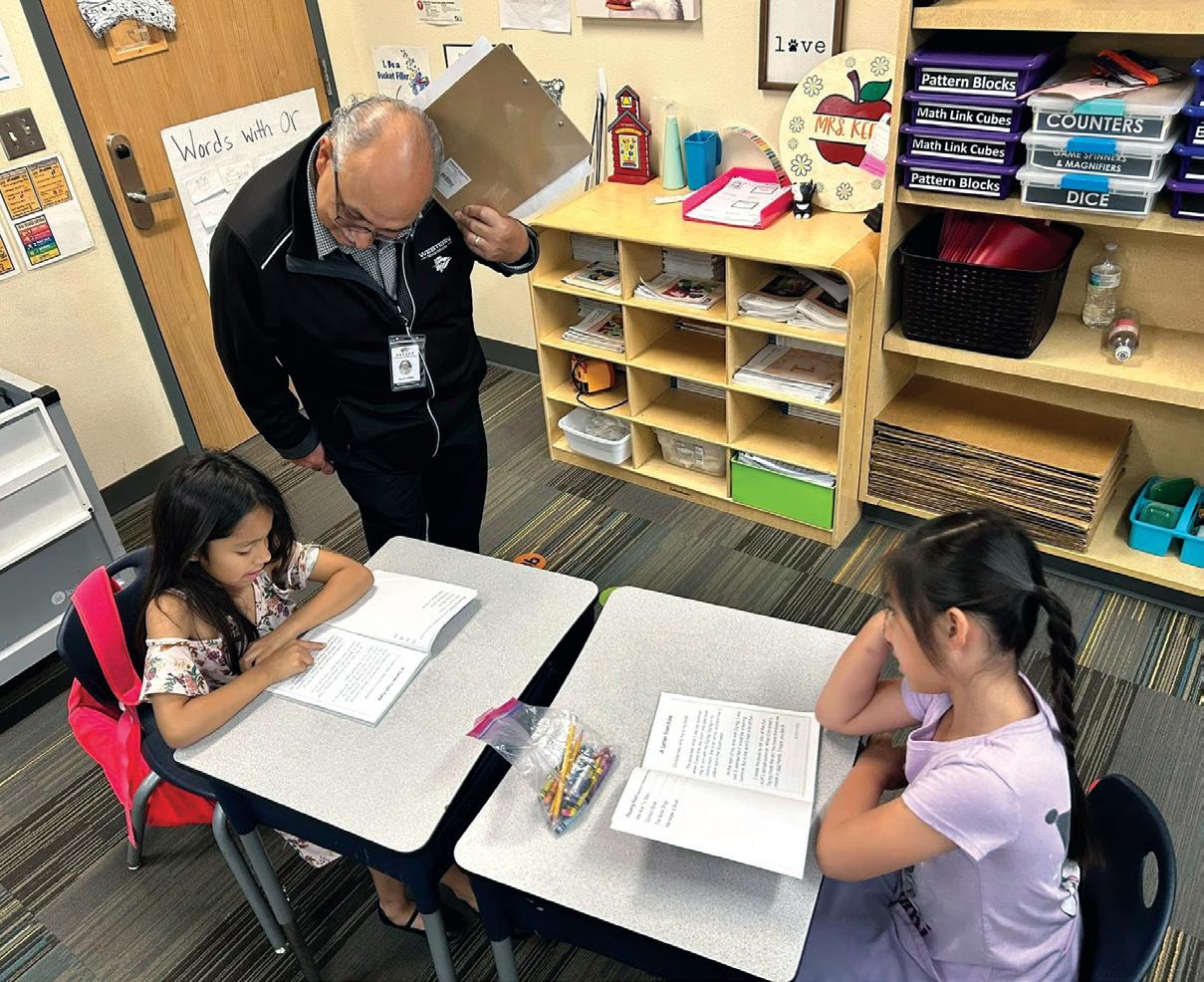
After the board walks, trustees debrief with campus leaders to share observations and reflections. The emphasis is on trends, not individuals, which keeps the focus on the learning environment rather than on performance evaluations. The goal is to foster understanding, celebrate strengths, and identify areas where resources or support might make a difference.
“This is an evidence-based, student-centered approach,” Gore emphasized.
The sticky notes play an important role, too. Board members are encouraged to jot down specific positives they observed — such as the way a teacher engaged students in discussion or incorporated technology into a lesson — and leave the notes behind as a gesture of appreciation.
“Board members pull me to the side and say, ‘She is amazing!’ and I say, ‘I know. Why don’t you send her an email and let her know how great she is,’” Gore said. “Because, man, when you get an email from a board member or from me saying board president Hinton couldn’t believe what he saw in your classroom today, that changes the experience of what a governing body does in a district.”
District officials make a point of involving a wide variety of campus leadership in the walks. Alongside trustees and district administrators, principals, assistant principals, instructional coaches, and department heads take part in instructional rounds. The athletic director, the head of maintenance, or the director of finance might join a board walk. This broad participation ensures multiple perspectives are represented and helps build shared ownership of instructional priorities across the district.
“It unites the family,” Gore said.
The impact has been notable. Board members report a clearer understanding of the challenges and opportunities teachers face. This perspective shapes conversations during board meetings, where decisions about curriculum, staffing, and resources now come with real-life context.
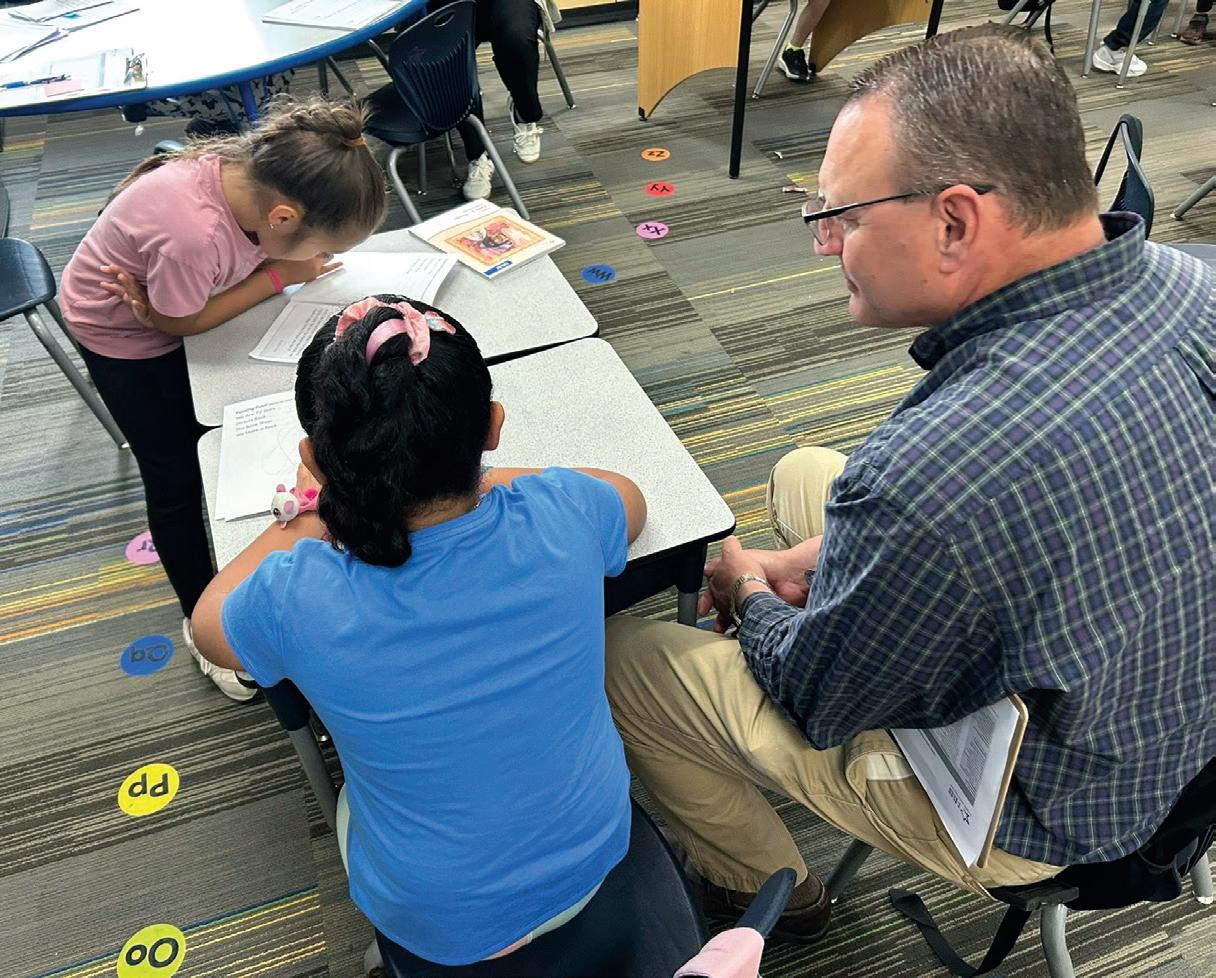
Snyder ISD trustees backed a bond election for this November with a 7-0 vote. Rauch credits the time they spent on campuses as playing a key role in its passage. Gore points to the fact that board members witnessed a bucket collecting water from a leak in a high school classroom as one of many experiences that had an impact.
By opening classroom doors, Snyder ISD has opened up a new dialogue between trustees and administration. The result is a stronger partnership, deeper trust, and a board that is more informed and engaged in the daily realities of education. Board walks are not just a strategy — they’re a bridge connecting governance to the heart of learning and building positive community messaging.
Morris, the communications director, points out that board walks have become a powerful tool for trustees. “Instructional rounds are a flashlight into what’s going on in the district and provide you with insight so you can go out and be an advocate for your district and your community.”H
Beth Griesmer is a staff writer for Texas Lone Star
• Set the stage — Be on campuses and in classrooms as an administrative team before introducing board members to the mix.
• Clarify the purpose — Make sure everyone understands that rounds are about learning and are not evaluations.
• Prepare participants — Give trustees a framework for what to look for such as student engagement, specific teaching strategies, or use of technology.
• Debrief and reflect — Build in time for participants to share observations and discuss next steps.
• Celebrate success — Highlight positive practices and consider leaving personal notes to acknowledge teachers’ efforts.
• Include diverse leadership — Bring in principals, instructional coaches, and other campus leaders to create a shared sense of responsibility and perspective.







By Laura Tolley



Tony Hopkins was home from college on Labor Day weekend in 1994 when he got the call.
“Good. You’re home,” said Wiley Murrell, then the athletic director at Friendswood High School. Murrell was in a pinch, and he seemed to know Hopkins could help. The team announcer had moved to Katy but forgot to tell his Friendswood ISD folks he couldn’t get back to call games.
“You’re the new football announcer,” Murrell proclaimed. “Please come to the stadium in an hour.”
Hopkins, who had some experience in the field, headed to the stadium and was soon calling his first varsity football
game: Friendswood High vs. Pearland High School. For the rest of that season, and for the following three years, Hopkins drove home from Beaumont’s Lamar University to be the “Voice of the Mustangs,” for his alma mater on Friday nights.
It wasn’t the first time Friendswood ISD needed his help, and it wouldn’t be the last opportunity for Hopkins to serve his district. The football announcer’s role has been his ever since that call, even after he was first elected to the district’s school board in 2008. And it’s one he is continuing as he takes on the added responsibility of serving as the 2025-26 TASB President.
“The proud and passionate strong voice that football fans hear on Friday nights is the same voice I hear whenever he advocates for the broader public education community,” said his predecessor, Rolinda Schmidt, a Kerrville ISD trustee who now serves as TASB Immediate Past President. “Tony is a born leader shaping the lives of young people in his own community and across Texas. He is a dynamic and dedicated trustee with a true servant heart.”
Hopkins talks a good game, but his actions on behalf of public education speak even more loudly. Both traits were nurtured in his hometown of Friendswood, a community south of Houston originally founded by Quakers. His parents moved there in 1973 from Texas City. Three years later, Hopkins was born.
Back then, Friendswood was largely a farming community, but it swelled in size as families moved to town after the opening of NASA’s Johnson Space Center in nearby Clear Lake.
NASA’s influence meant Hopkins grew up around astronauts and their families as well as aerospace engineers and rocket scientists. But he said Friendswood has always had a small-town feel. “What hasn’t changed is the focus on faith, family, and education.”
At Friendswood ISD, Hopkins remembers “constantly pushing the boundaries to experience everything life had to offer.” He explored his love of math, music, and sports.
His entrepreneurial streak also took hold in his hometown, where at age 9 he started a business mowing lawns and doing other small jobs for neighbors.
“I was known for riding my bike to the bank on Saturday mornings to deposit my earnings. I would get the free donuts and listen to the businessmen in town talk about what deals they were doing,” Hopkins recalled.
The mowing business grew over the years, allowing him to save enough money to help cover tuition and other expenses at Lamar University, where he initially planned to pursue a career in sports administration or broadcasting but instead got a degree in finance. Next was Rice University, where he earned an MBA in Finance and Entrepreneurship — and announced Owls home baseball games.
Those Saturdays at the bank spent listening to businessmen planted the seeds for a 19-year career in mergers, acquisitions, and corporate finance in the power generation sector. In 2018, he purchased an interest in Modular Plant Solutions, a company that has a patented modularization technology and has
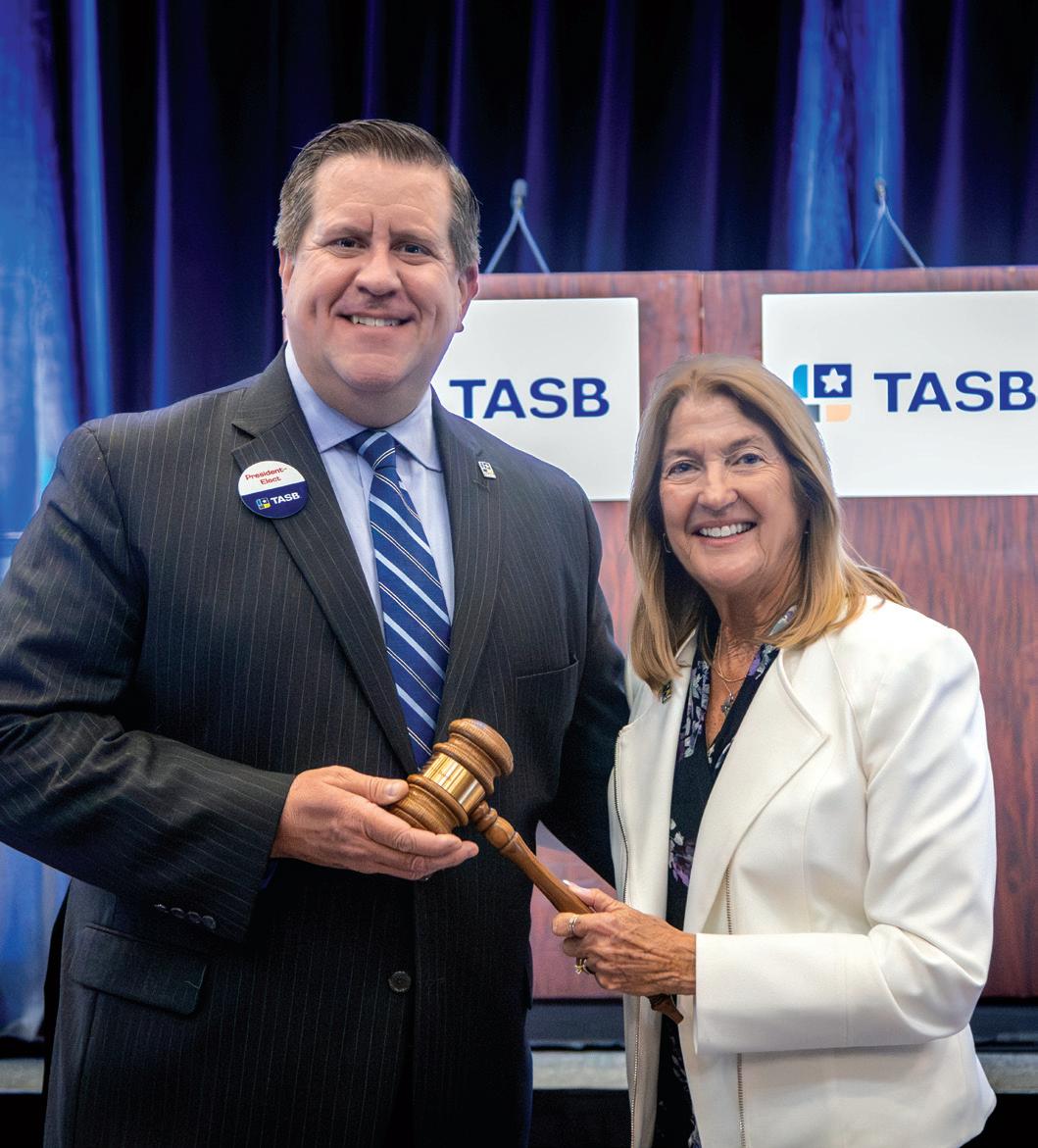
It’s official! At the 2025 Delegate Assembly, the leadership gavel was passed to Tony Hopkins (left), who is the 2025-26 TASB President. Rolinda Schmidt (right), a Kerrville ISD trustee, is now TASB Immediate Past President. Hopkins also is Friendswood ISD’s board president.
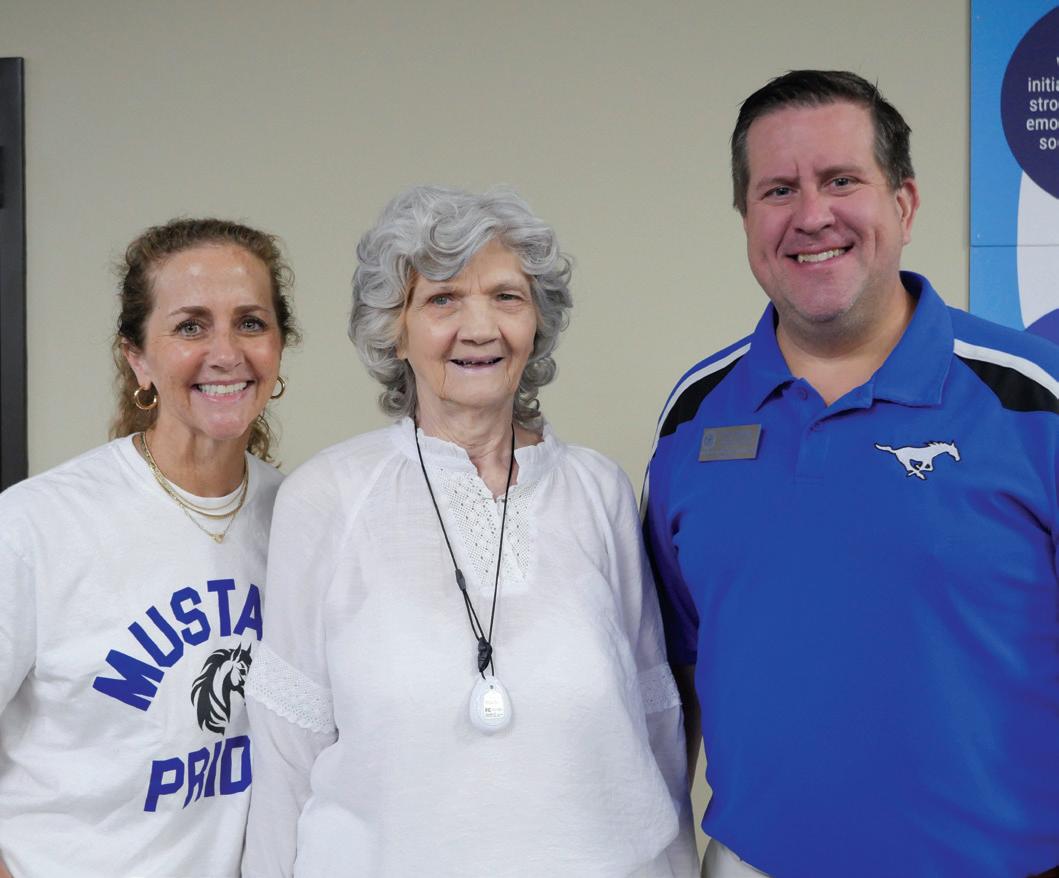
Hopkins (right) and Laura Seifert, Friendswood ISD board secretary (left), join an honoree at the district’s Mustang Senior Gold Club event, which celebrates generations of Friendswood ISD supporters.
designed modular methanol and gasoline refining facilities. He also serves as a fractional chief financial officer for 14 companies in the Houston area.
Hopkins and his wife, Sheri, have two children. His son, Cooper, is a 2024 graduate of Friendswood High School and is finishing Electrical Lineman’s Academy at Texas A&M Engineering Extension. Daughter Bailey is a sophomore at Friendswood High and is on the varsity volleyball team.
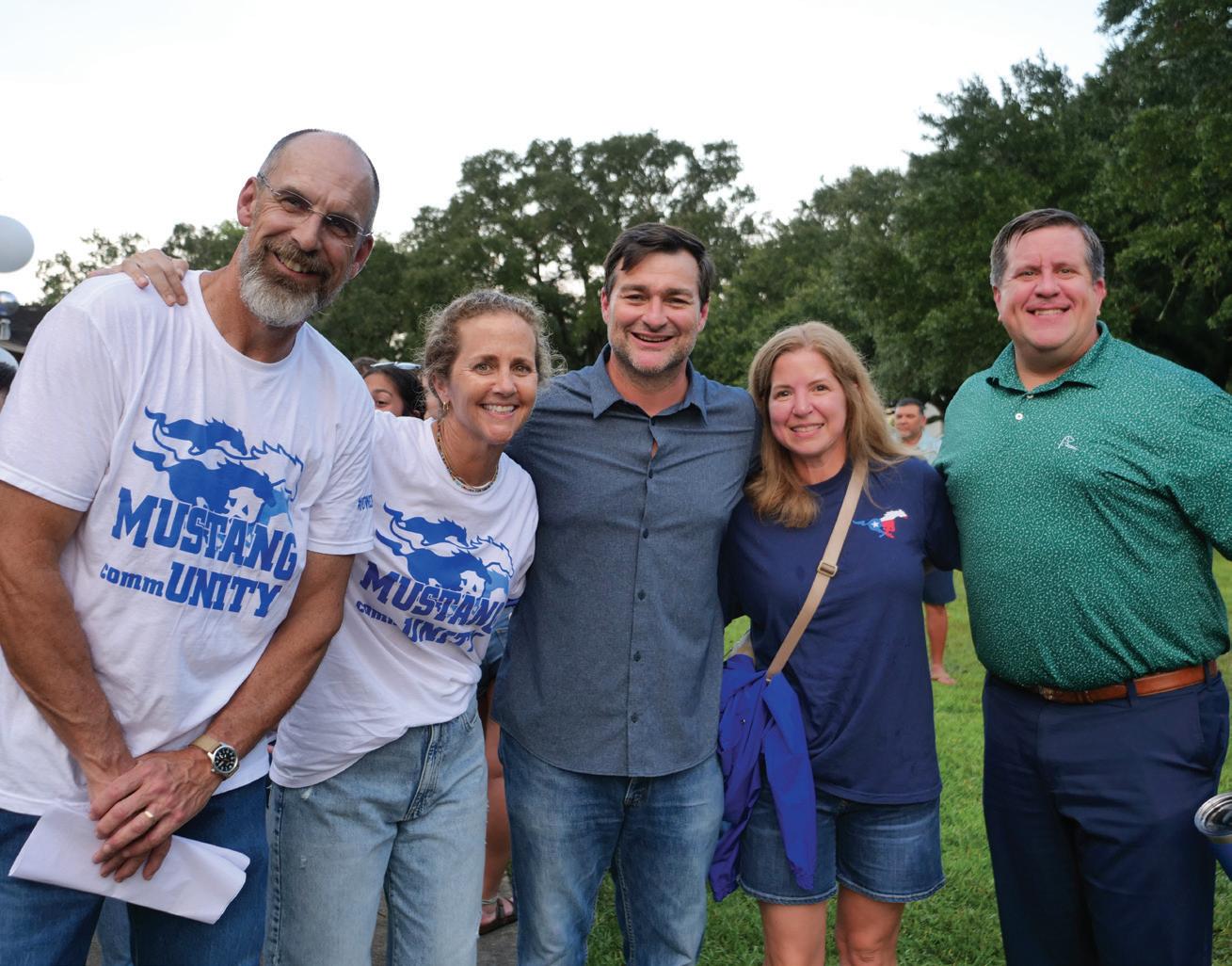
Mustang spirit was out in force in August at Friendswood ISD’s ninth annual Under the Oaks event where Hopkins (right) joined families, staff, and fellow community members to kick off the 2025-26 school year in a show of unity, pride, and support for the district’s commitment to excellence.
Running for public office had long been a goal since his high school days when he was a student council member — but he hadn’t envisioned a spot on the school board. Yet there was a need, and once again, Hopkins seemed the right person for the job. A mentor from church and business told him about a trustee with deep financial expertise who was rolling off the board. He wanted Hopkins to consider running.
“When I hesitated, he made the final pitch that no one would run against me because I had been the football announcer in town for 15 years and would be able to speak to all of the voters every Friday night throughout the election season,” Hopkins recalled.
Hopkins ran, unopposed, for four elections, finally getting an opponent in the November 2024 race, which he won by 19 percentage points. He has served as board president since 2018.
As is his style, Hopkins immediately “dug into” school board work, reading and analyzing everything he could about Friendswood ISD and public education. “I quickly figured out that this really was a business to run.” And the “business” is all about serving the more than 6,000 students at Friendswood ISD.
Superintendent Thad Roher said Hopkins “has been shaped and formed into the man he is by the community that has surrounded him here in FISD. His loyalty to not only pay that back but making the same thing possible for every FISD student is what drives his passion and makes him special.”
Hopkins credits his fellow trustees with consistently being well-prepared for each meeting. “We’ve always had a really good board,” he said.
A consensus builder, Hopkins said he works hard to carefully set the stage for various issues to help ensure a positive outcome. His board will have long, thoughtful, respectful conversations about issues before taking a vote. They take the
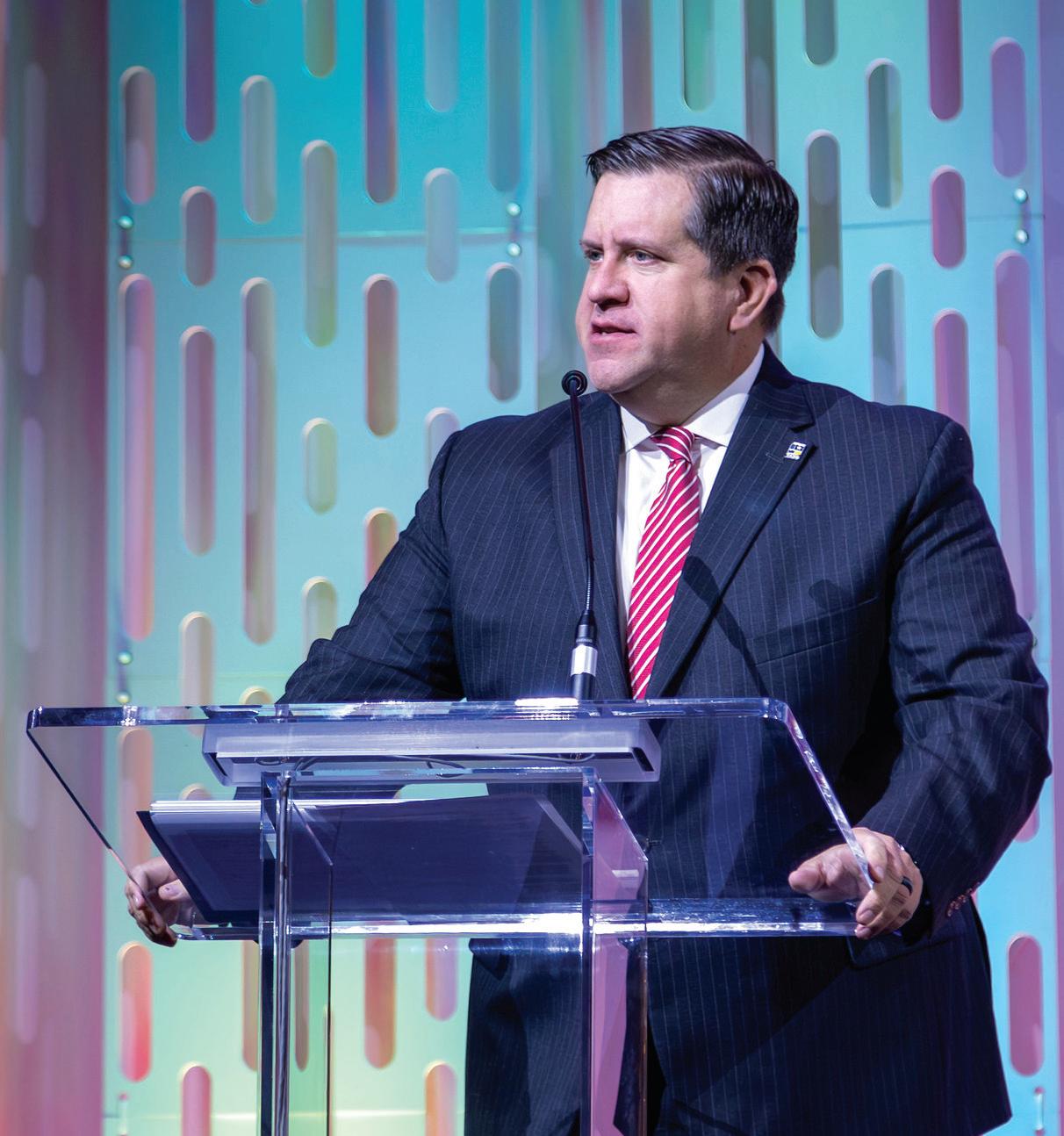
Hopkins speaks at the 2025 Summer Leadership Institute in Fort Worth. The new TASB President said he first got involved with the Association by attending conferences and Delegate Assembly.
time to build a consensus and understanding among members.
In his nearly 17 years of service, the board has overseen a wide range of projects and initiatives — from replacing the district’s original school from 1939 with a modern building in 2010 to expanding the career and technical education, fine arts, and athletic programs. The district has won multiple Lone Star Cups and Academic Decathlon State Championships, all while maintaining one of the highest academic ratings in Texas.
Board work naturally led to attending TASB conferences and Delegate Assembly, the Association’s annual business meeting.
“I learned a ton from other board members and experts across the state,” he said. “Leadership TASB was a formative experience in expanding my perspective from focusing on our local issues to realizing what happens at the state level.”
Hopkins was a director and officer with the Gulf Coast Area Association when he sought a seat on the TASB Board of Directors when it opened in 2017.
Being part of TASB’s leadership has allowed him to “identify issues earlier so that we can be prepared to deal with those issues. I have then been able to be a resource to neighboring districts in my region as well.”
As TASB President, Hopkins wants to focus on visiting with board members across Texas to discuss the Association’s new strategic plan “so they can see the nonpartisan local government focus that TASB has to make each district better.
“I also want to work on conveying the value of being a local voice for change, both in your community and with your local leaders at the state level,” Hopkins said. “I look forward to traveling across the state of Texas to carry the message of
the importance of public education and how it is the great equalizer in our society that can allow anyone that has a good education and work ethic to achieve the American dream.”
Hopkins enjoys taking on a challenge; maybe it’s a life lesson learned through his sports background.
Sports have always been a part of his life. Playing sports was the early goal, but a knee injury changed his trajectory. In addition, his voice dropped a few octaves in junior high, which helped him with his next challenge.
While in eighth grade, the athletics coordinator told him one day he was going to announce a junior high girls’ track meet and then the boys’ meet the next day. “I did it, and everyone was impressed by how well I helped it run. Then I went to high school and started with basketball, then baseball, and most other sports.”
As a freshman at Friendswood High School, Hopkins became the basketball manager for then-coach Mark Griffon. It was a job he kept all four years.
“As a student he was very organized and had knowledge of the game, so he quickly started keeping all our stats. Tony basically became an assistant coach and organized all our stats,” said Griffon, now the high school’s principal. “He was passionate about performing well in school academically and being involved in co-curricular activities, including our high

school musical. I can honestly say I don't think the ‘Hop’ ever missed a game or made a mistake with a stat.
“As a board member and the ‘Voice of the Mustangs,’ he is a huge supporter of all our kids and FISD. He motivates our kids to get involved in activities and excel to enrich their high school experience,” Griffon added. “Tony has helped to build, and has been a part of creating, the FHS tradition of excellence. He lives, shares, and models that excellence with parents and students everyday as the president of our school board.”
For Hopkins, it’s all about giving back to a community that has given him so much and voicing support for public education — and high school football.
“As the VOTM, I love the excitement and joy I can bring to the community on a Friday night.”H
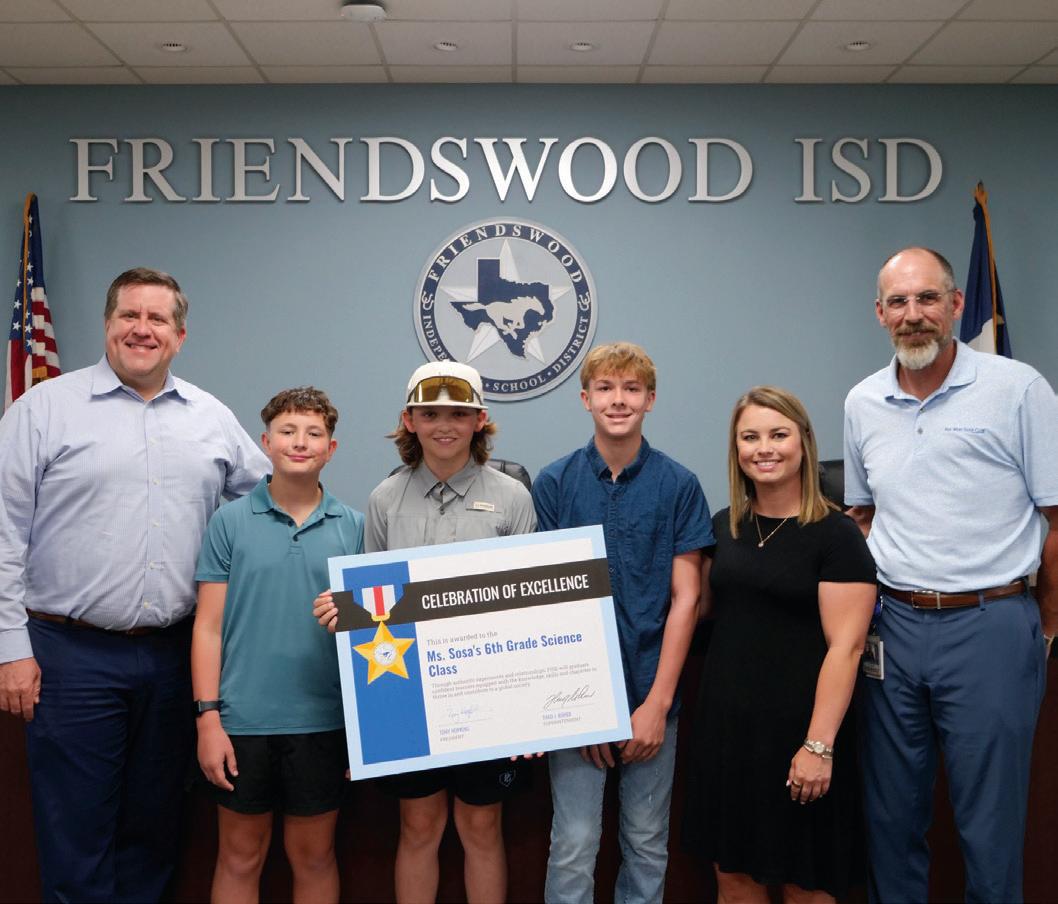
• Silence is Golden! Listen first — to your community, to your board, and to district staff.
• Take your time to build consensus, even if it means delaying a decision to the next meeting.
• Be the most prepared person in the room.
• Ensure that everyone is heard and respected in your meeting.
• Keep a focused agenda and everyone on task to complete the agenda in an efficient manner.
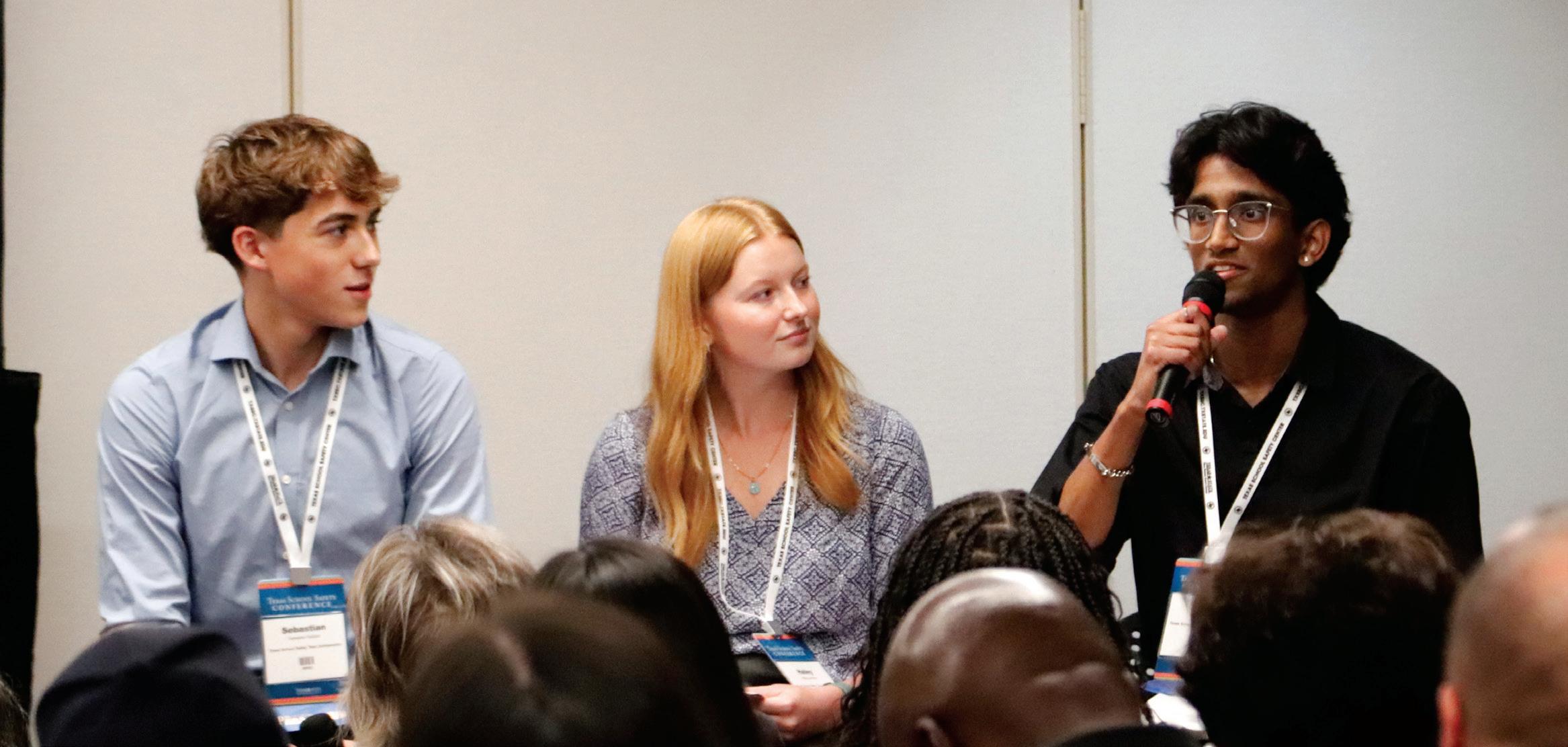
As part of its youth and community initiatives, the Texas School Safety Center started an ambassador program for teens to serve as the state’s youth voice for engaging their peers in school safety initiatives.
The Texas School Safety Teen Ambassadors initiative started in September 2024 with nine high school seniors from across Texas who graduated from the program this past August. The second cohort has started its training and work.
During the yearlong program, teen ambassadors receive training, attend events, educate peers on various issues, and work with school administrators to help create a safe and healthy campus environment.
These ambassadors are dedicated to helping fellow students learn about teen mental health, the dangers of drug use, violence prevention, and emergency preparedness.
In addition to engaging the state’s youth in school safety initiatives and helping school administrators, ambassadors also collaborate with TxSSC staff to create school safety training and activities for youth.
These student volunteers have experienced overwhelming acceptance from peers as someone who’ll listen to their concerns and suggestions for making their schools safer places for everyone on campus.
TxSSC, a research center at Texas State University in San Marcos, is tasked by the Texas Education Agency and Gov. Greg Abbott’s Homeland Security Strategic Plan with key school initiatives and mandates. The center serves as a clearinghouse for the dissemination of safety and security information for K-12 schools and junior colleges across Texas.
Texas Lone Star talked to Kathleen Bates, TxSSC youth initiatives program manager, about the teen ambassador program. Her comments have been lightly edited.
by Theresa Gage-Dieringer
Q: How did the Texas School Safety Teen Ambassador program get started?
The program launched this past school year (2024-25) and is part of a larger program at the Texas School Safety Center known as the Youth School Safety Program. This new initiative is now available to all Texas schools. Our first cohort of ambassadors worked with staff to develop the purpose of the Youth School Safety Program as well as the branded movement for students to join. That branded youth movement is called KEYS — Knowledge Empowers Youth Safety. It is a program that features a variety of resources and training designed by youth for youth.
Q: Why should students be interested in and excited about participating in the program?
So many young people are looking for an opportunity to lead, learn, and protect their friends and peers. The teen ambassadors receive a unique opportunity to become leaders and changemakers within their school. They are able to make a real difference by advocating on behalf of their peers not only at their school but for the state. Ambassadors collaborate with TxSSC staff on projects and resources to share with all Texas schools. They gain leadership experience and communication skills that will benefit them into adulthood, and they receive the opportunity to network with like-minded youth from across the state.
Q: What does being a teen ambassador for a year entail?
Teen ambassadors are required to fulfill a service agreement, which includes the following items:
• Stay current on school safety topics, youth advocacy, and teen leadership through assigned research and training.
• Attend at least one school district board meeting to understand how their district discusses school-related issues.
• Attend at least one Texas School Safety Center Board of Directors meeting.
• Present at the annual Texas School Safety Conference.
• Present during the virtual Youth School Safety Summit.
• Plan and implement a project or event for their school that addresses teen drug-use prevention, teen mental health, violence prevention, or emergency preparedness.
• Meet monthly with TxSSC staff and fellow ambassadors through Zoom.
Q: What aspects of safety do ambassadors address? Teen drug use, teen mental health, violence prevention, and emergency preparedness.
Q: What types of events do ambassadors lead or attend?
Ambassadors participate in and present at the annual Texas School Safety Conference as well as the Youth School Safety Virtual Summit.
Q: How are students empowered to share their voices or influence safety practices on their campuses?
Each ambassador is required to implement a project for their school/district that supports their school/district’s efforts in creating a safe and healthy school community. Before speaking with the school/district administration, ambassadors receive intense teen leadership training at the Texas School Safety Center’s Teen Ambassador Fall Orientation. Over the course of four days, ambassadors learn about the mission and goals of the TxSSC, how their role helps support the work of
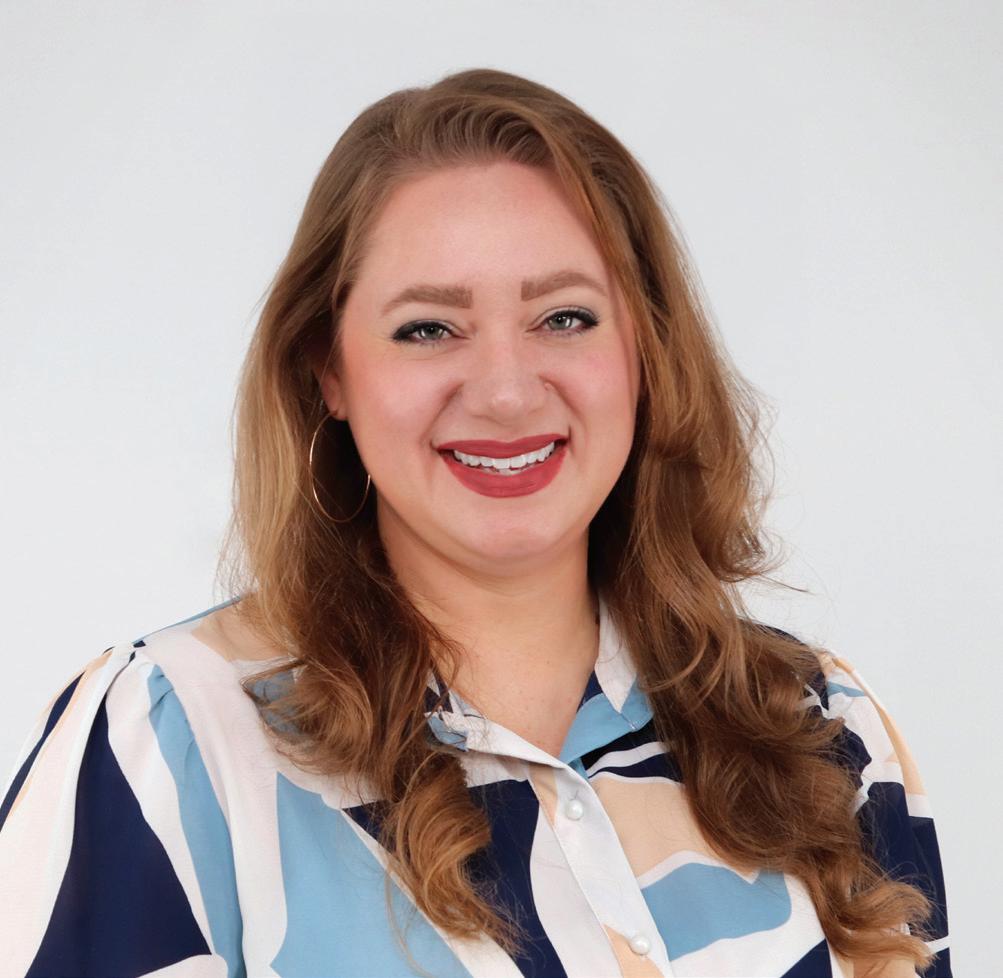
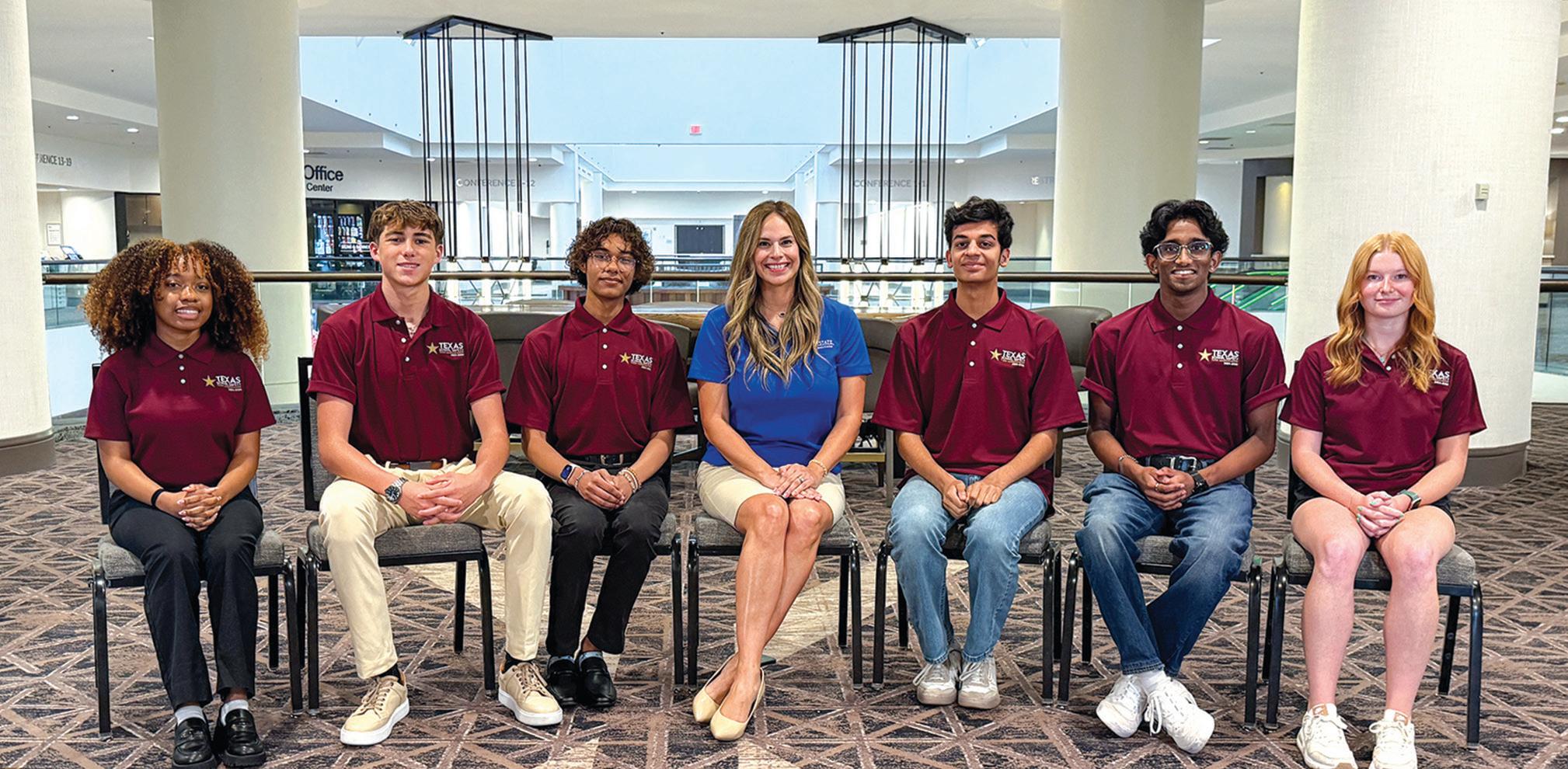
the TxSSC, how to serve as the student voice for their campus and state, and how to establish relationships with key administrators to become integrated into various school safety discussions.
Q: What kind of impact have you seen from the program — on campuses, in communities, or with the students themselves?
There has been an overwhelming amount of positive reception on campuses, within communities, and from students. Many ambassadors have had the opportunity to establish relationships with key school administrators, speak at school safety summits, and build professional connections with those working on school safety issues. Ambassadors have also reported an overwhelming amount of acceptance from their peers as some ambassadors have become the “go-to” person to share student concerns.
Q: What has been the most rewarding aspect for students serving in this role?
I think what has been most rewarding for students serving as ambassadors is a feeling of acknowledgement. So many young people have thoughts, opinions, and ideas on how to solve challenges, but they are afraid to speak up for the fear that adults will not listen. The teen ambassador program not only proves that young people are welcome to share their solutions, but it helps to break down barriers between students and adults and encourages both parties to start having meaningful conversations.
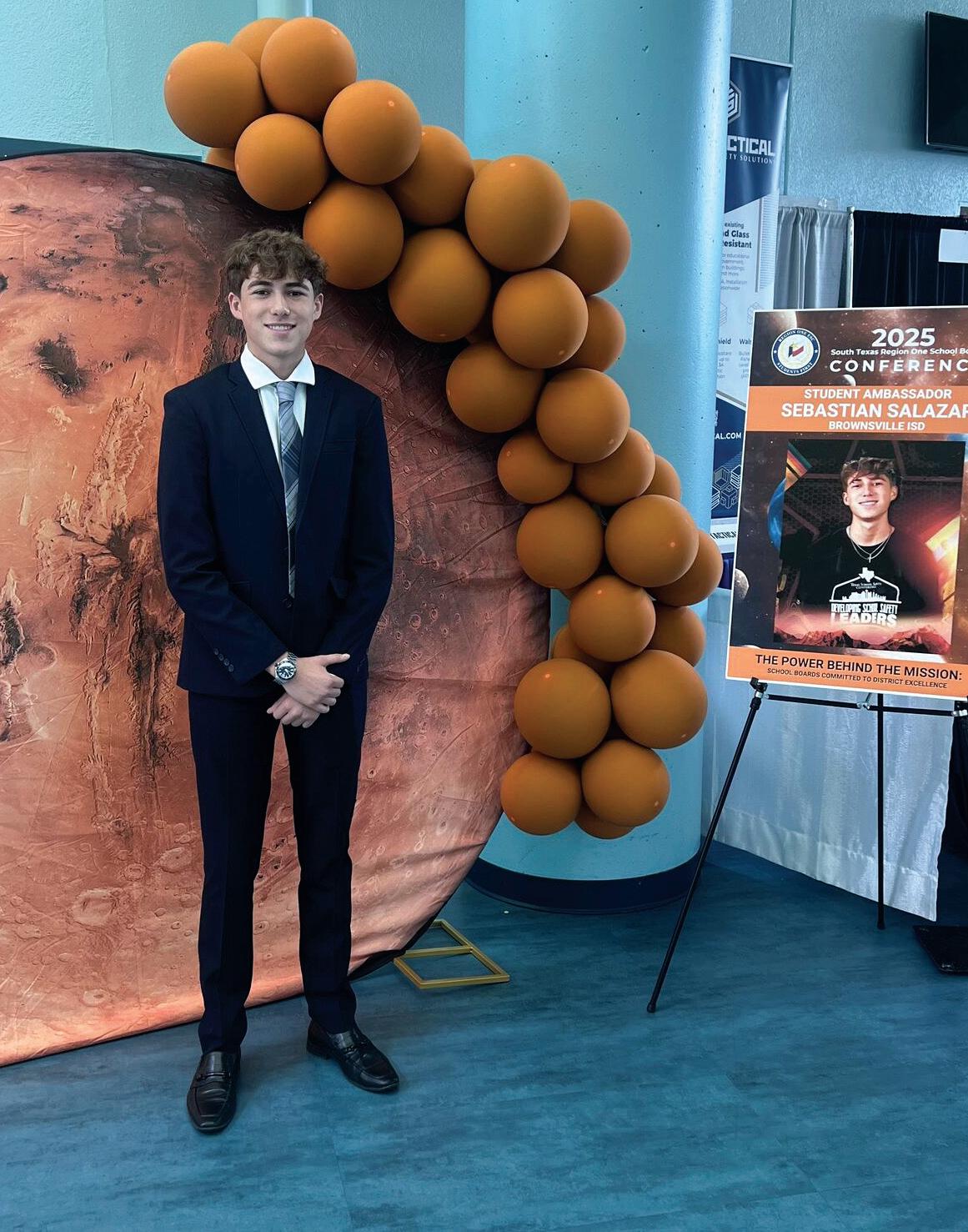
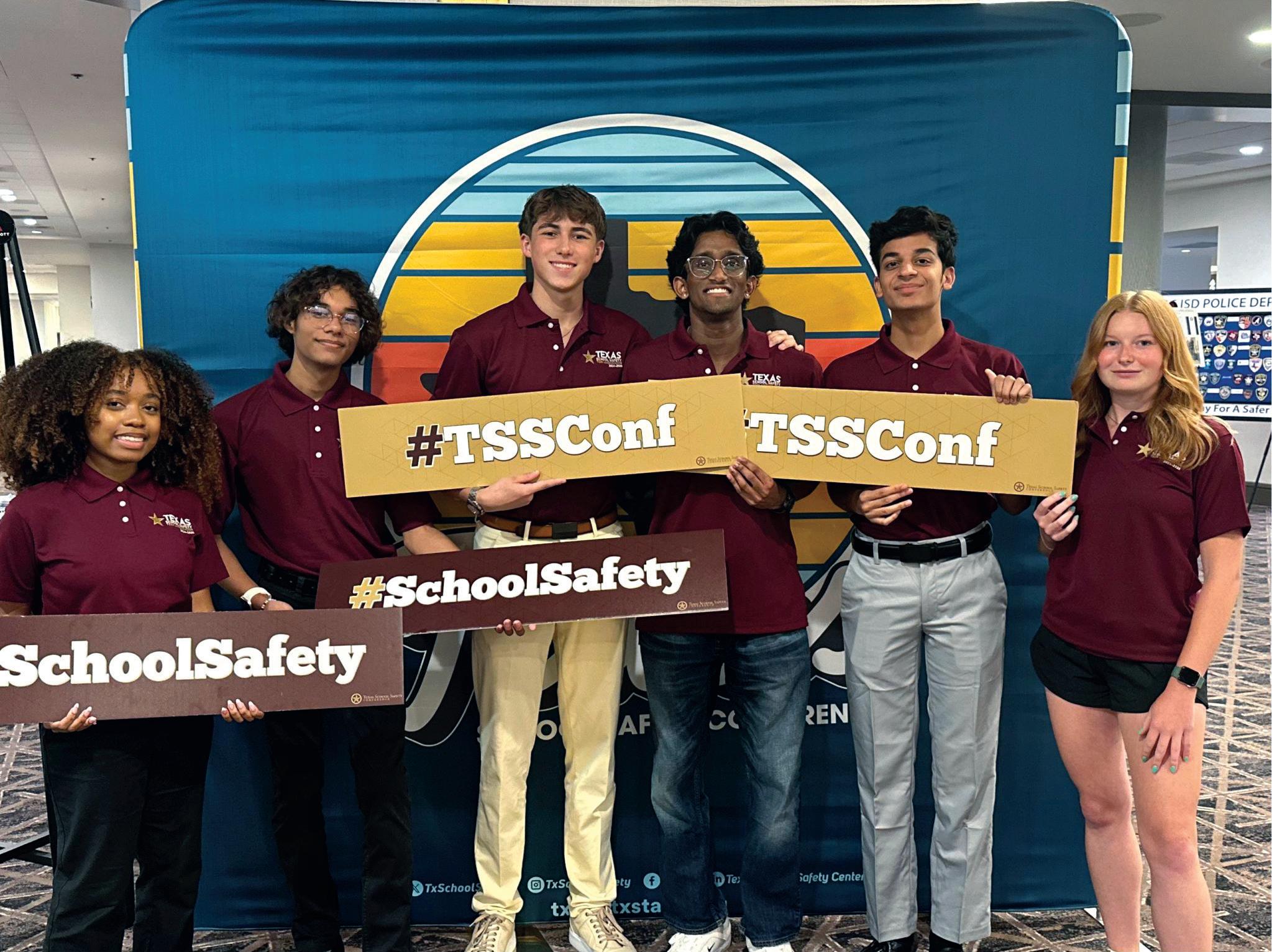
Q: Is there a particular student story or moment that stands out to you as especially meaningful?
All the teen ambassadors this year have been able to accomplish so many wonderful things that it is hard to pinpoint one story. These young people are incredibly passionate and determined to help build safe and healthy schools. It is incredibly powerful to witness the excitement and positive energy in a room when teen ambassadors and school personnel are discussing solutions together.
Q: Do any teen ambassadors want to pursue careers in education, public safety, or related fields?
Even though the teen ambassador program is entering its second year, we have had several students express interest in pursuing careers in education, public safety, or a related field.
Q: What advice would you give students interested in applying?
This role is about making schools feel safer, so think deeply about why that matters to you. Highlight any experience you have with leadership, teamwork, and school safety initiatives. Also, show that you understand safety isn’t just about rules. It’s about understanding people and building trust between students and adults. It’s about demonstrating maturity, empathy, and a strong sense of responsibility. Also, it is important to apply with ideas on how you could improve safety and well-being on your campus. Whether it is starting a mental health awareness campaign or organizing reunification drills, all efforts help support a safe and healthy school.H
Theresa Gage-Dieringer is a staff writer for Texas Lone Star.
• This year’s program has begun, but applications for the 2026-27 program will be open January-May 2026.
• Students must submit an application, film an introductory video, and obtain two letters of recommendation.
• Each term begins September 1 and ends August 31.
• Texas residents entering grades 9-12 for the upcoming school year are eligible to apply.
• Students applying for the program should have experience working on drug-use prevention, teen mental health, violence prevention, and/or emergency preparedness.

Scan for more information on the Texas School Safety Teen Ambassadors program and the application process.
by TASB Legal Services
The Texas Legislature this year enacted significant changes to the Texas Open Meetings Act and Texas Education Code, affecting how school districts handle meeting notices, maintain and provide access to official meeting records, and manage public comments at board meetings.
Because some revisions depart from longstanding legal requirements, districts with established practices will need to adjust their preparation to ensure full compliance. Following is an overview of the changes and best practices to help districts remain compliant and prepared under the new open meeting requirements.
What changes have been made to the meeting notice requirements?
For decades, the OMA has required that “the notice of a meeting of a governmental body must be posted in a place readily accessible to the general public at all times for at least 72 hours before the scheduled time of the meeting.” Following the passage of House Bill 1522, which became effective Sept. 1, the law now requires that notice be posted “three business days before the scheduled date of the meeting.”
The term “business day” is not defined in statute, but in common usage, the term refers to any standard weekday, from Monday through Friday, excluding weekends, which include both Saturday and Sunday, as well as any official holidays.
A clear reading of the statute shows that the day of the meeting cannot be counted toward the three business days required for the meeting notice, because the law specifies “before the scheduled date of the meeting.” It also appears that the date the meeting notice is posted can-
not count, particularly given the statute’s requirement that notices be posted “at all times.” There is a consensus among entities subject to the OMA that this means notices must remain posted for three full business days between the date of posting and the day of the meeting.
HB 1522 also requires that if a district plans to hold a meeting at which it will discuss or adopt a budget, the meeting notice must include a physical copy of the proposed budget. If there is no physical copy, the budget must be clearly accessible on the governmental body’s website homepage, along with a taxpayer impact statement for a median-valued homestead property, showing in dollar amounts the comparison between the current fiscal year’s property tax bill and the estimated tax bill for the upcoming fiscal year if the proposed budget is adopted.
This new requirement also became effective Sept. 1. The deadlines to adopt budgets have already passed for both July 1 and Sept. 1 districts, with the latter’s deadline occurring Aug. 31. Looking ahead, these new requirements will affect the budget adoption process for the next fiscal year.
With the passage of Senate Bill 12, which adds Section 26.0071 to the Texas Education Code, districts are now required to develop a parental engagement policy that requires board meetings to be held outside of “typical work hours.” The statute does not define “typical work hours,” but because this requirement is part of a parental engagement policy, districts should consider when parents

are most likely to be available to attend meetings.
To accomplish this, districts are well-advised to gather community feedback or conduct surveys before finalizing procedures for scheduling meetings. They should also consider documenting the decision-making process for selecting meeting times to demonstrate that community input was considered and valued, in accordance with the new parental engagement policy.
What changes have been made regarding public comment?
Another part of the parental engagement policy in SB 12 requires school boards to prioritize public comments by placing them at the beginning of each meeting. Several districts already follow this practice because the OMA (Texas Government Code section 551.007) requires boards to allow testimony on specific agenda items before or during their consideration. With the more specific and recently enacted Texas Education Code section 26.0071 now mandating that public comments be prioritized at the beginning of board meetings, school districts will be required to adopt this practice moving forward.
What are the new open meeting records requirements?
Senate Bill 413, which also became effective Sept. 1, expanded the requirements in Texas Education Code section

11.0621 related to the minutes of a regular or special meeting of the board of trustees. The minutes of a board meeting must now include each member’s attendance or absence as well as their vote on any item. In addition, the board must post the approved minutes, along with any adopted resolution, on the district’s website no later than the seventh day after the meeting at which they were approved or adopted.
It is common practice for boards to hold a meeting, prepare the minutes, and then wait until the following month’s board meeting to make revisions or amendments to ensure accuracy before approving them. Since the bill specifies that minutes must be posted “as approved by the board,” they do not need to be posted until they have actually been approved at an open meeting.
If you have questions about these issues, consult your district’s attorney or call TASB Legal Services at 800-580-5345.H

Why choose student accident and athletic insurance from TASB Benefits Cooperative’s awarded provider, Texas Kids First?
• Coverage on or off campus designed to insure students participating in University Interscholastic League (UIL) activities
• Trusted by trainers it’s endorsed by Texas State Athletic Trainers’ Association and Southwest Athletic Trainers’ Association
• Connected statewide insuring more than 275 school districts and a network of over 3,000 medical providers in Texas
• Top rated by A.M. Best Company, a leading insurance rating authority*
This article is provided for educational purposes and contains information to facilitate a general understanding of the law. References to judicial or other official proceedings are intended to be a fair and impartial account of public records, which may contain allegations that are not true. This article is not an exhaustive treatment of the law, nor is it intended to substitute for the advice of an attorney. Consult your own attorney to apply these legal principles to specific fact situations. Administered by
by Dax González
Nearly 300 school trustees convened in Houston on Sept. 13 for TASB’s Delegate Assembly to vote on the future direction of the Association.
The trustees, who came from across the state and represented the vast spectrum of Texas school districts, elected TASB leadership, approved changes to the Association’s bylaws, and amended the 2024-26 Advocacy Agenda that will direct TASB’s legislative efforts during the 89th legislative interim.
The new Advocacy Agenda includes a major overhaul and streamlining of TASB’s Advocacy Priorities as well as six new resolutions added to the previous 51 adopted last year. TASB’s Legislative Advisory Council, consisting of trustees elected during the 2024 Grassroots Meetings, recommended a slimmed-down version of the Advocacy Priorities that responds to actions taken by the 89th Texas Legislature and focuses on key issues that may arise during potential special sessions.
The new Advocacy Priorities adopted by Delegate Assembly call upon the Legislature to:
• Invest in students and properly resource all public schools based on enrollment by increasing state funding through the basic allotment and biennially adjusting it for inflation.
• Invest in all public school personnel by expanding and strengthening programs that develop, support, and compensate a highly qualified workforce.
• Empower local communities by recognizing the authority of local school boards to govern school
districts and advocate for their students while equipping communities with the tools and flexibility to effectively serve students.
Delegates also added six new resolutions that address support for behavior management training and flexibility, revocation of vouchers, and preservation of school leaders’ ability to advocate.
The updated Advocacy Agenda will remain effective until the 2026 Delegate Assembly adopts a new one.
It is important to note that the Assembly voted to amend TASB’s bylaws to expire the TASB Resolutions process, so this is the last year they will be included in the Advocacy Agenda. TASB will be implementing a process to capture and share local priorities from school districts to help inform the Association and others on the priorities of local school boards.
The full Advocacy Agenda can be found at gr.tasb.org
State Sen. José Menéndez (D-San Antonio) spoke to School Board Advocacy Network members during the annual SBAN lunch in Houston on Sept. 12. Attendees heard Menéndez’s thoughts on the Legislature and issues facing public schools. He shared particularly relevant insights on how school board members should develop working relationships with their local legislators and their communities back home. TASB is especially grateful to Menéndez for sharing his candid perspective of the session and how school leaders can prepare for the next session.
SBAN is a free TASB service that empowers school trustees to influence key
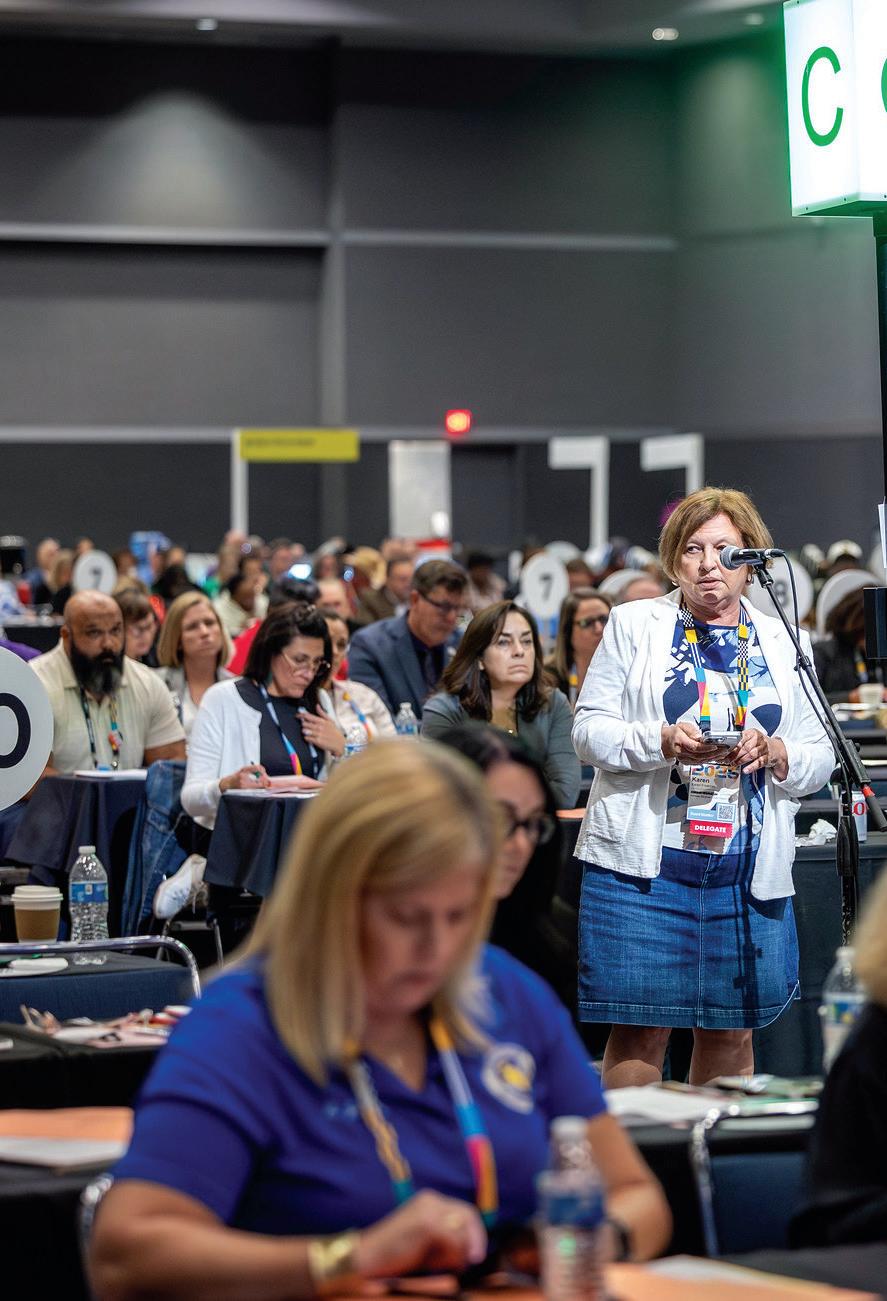
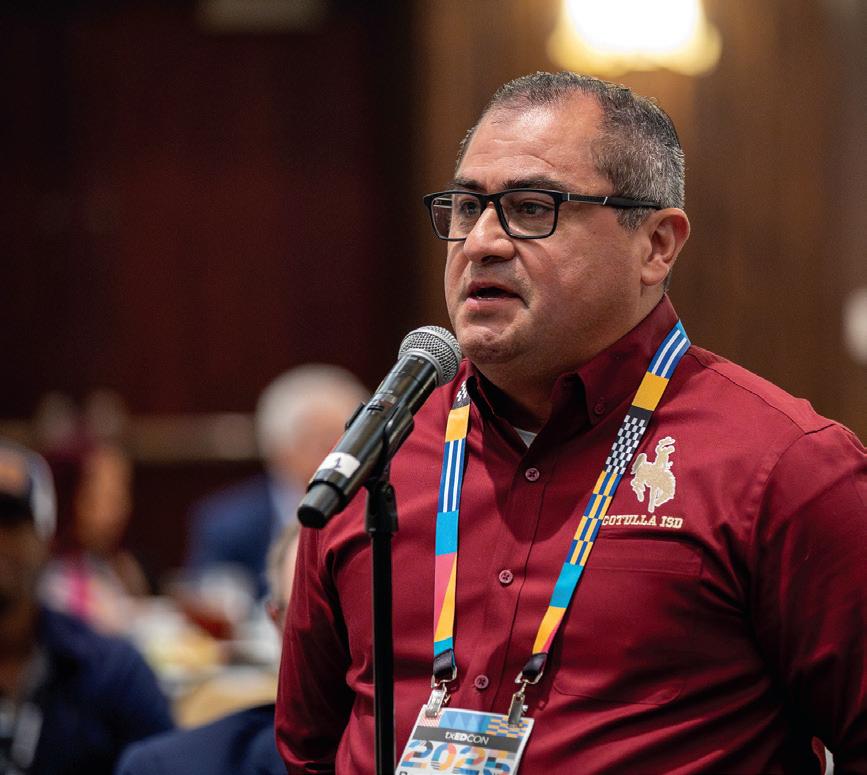
policymakers by quickly mobilizing hundreds of school leaders to communicate positions and information on critical bills and issues. SBAN alerts include detailed background information, suggested steps for taking action, and resources for contacting legislators and other policymakers.
If you are not currently a member, join the hundreds of other school board leaders who already take advantage of SBAN to advocate on behalf of Texas schoolchildren and public schools. Remember, one of your primary functions as a school board member is to advocate on behalf of your school district and its students, so sign up today!

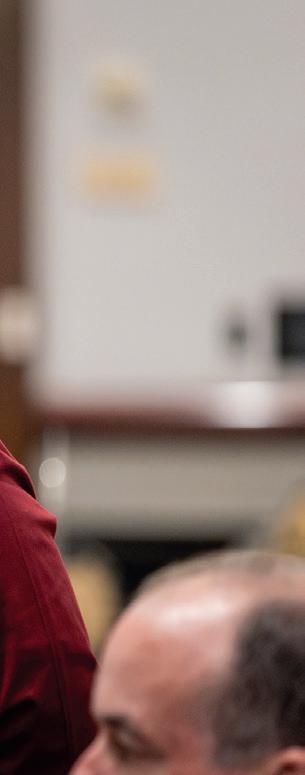
For more information, contact Dax González at 800-580-4885 or dax.gonzalez@tasb.org H
Dax González is division director of TASB Governmental Relations.

Whether you are planning for the next year, decade, or generation, find the bond investment solution you need with Lone Star Investment Pool. Contact our experienced team for advice on investing any amount and to see how Lone Star can help your district achieve its financial goals.
Large amounts or small, Lone Star invests it all.
Scan to sign up for SBAN membership.

by Robert Long III
Supporting trustees and boards with training, continuing education, and customized in-district consulting have been central to the mission of Board Development Services. Our BDS consultants seek to provide members with best practices and training that are fact- and research-based, leading to stronger boards and enhanced board governance.
Because we are here to be guideposts for members along their school board service journey, TASB has had the foresight to begin the process of decentralizing its BDS consultants, moving to regional assignments.
We are always looking for ways to be of service and to make the work easier for our members. With a switch to regional consultants, we know that the connections we build will be strengthened, and the support we provide will only become more highly targeted and impactful.
With regionalization:
• There is a statewide service quality that leverages the consultants’ ties to their respective regions and communities.
• Each consultant is uniquely equipped to provide individualized in-district support.
• When consultants are in the field, they are also communicating the distinct needs of their regions to the Association and its leadership.
• The two-way exchange of information fortifies TASB’s statewide commitment to providing exceptional service while embracing our members’ local control and local voice.
Building strong relationships with trustees, boards, and leadership teams requires a clear understanding of the challenges being faced so consultants can provide customized support to address each district’s individual needs. Now, with this decentralized approach, we are excited to foster relationships we’ve already built while growing new connections with districts near and far.
Understanding that every district and board in the state is unique means we must be exceptionally prepared to provide the expertise and resources required to
meet the specific needs of each and every one of our member districts. It is through this process of providing unparalleled guidance and facilitation that we gain an even greater understanding of trends, challenges, and opportunities in the communities we serve.
In addition, when a BDS consultant brings an understanding and shared context of a community to the work, it only accelerates trust and builds the connection to the work and the districts they serve. When they live in or near a region they serve, it allows for a greater understanding of values, challenges, and opportunities to offer even more tailored guidance and support.
As a reminder, our BDS consultants are here to support you with your board governance needs, such as:
• Superintendent evaluations
• Whole board coaching
• In-district consulting
• Team building
• Customized leadership team training
By investing in a regionalized structure for our BDS consultants, TASB is positioning itself not just as a provider of
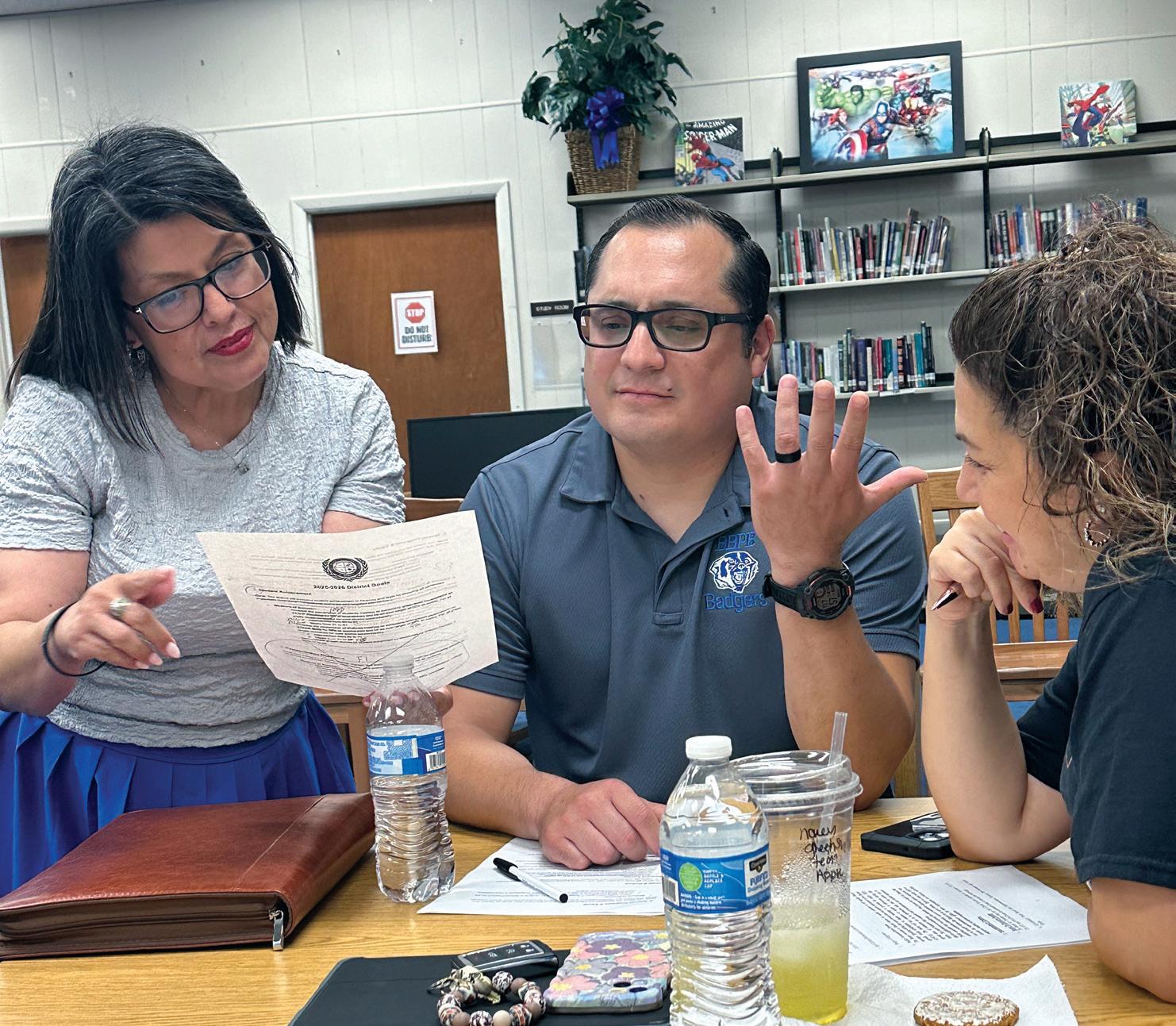
high-quality professional development services but as the trusted thought-partner boards have come to know and expect. We will continue to walk beside you, our members, ready to support your learning and leadership journey.
Everything we do, we do with the goal of bolstering our members so that you can support your students and school communities. Like you, we want public schools to thrive so that all students can achieve.H
Robert Long III is the division director for Board Development Services and the program manager for Leadership TASB.

Learn more about our team and how we can provide regional support.

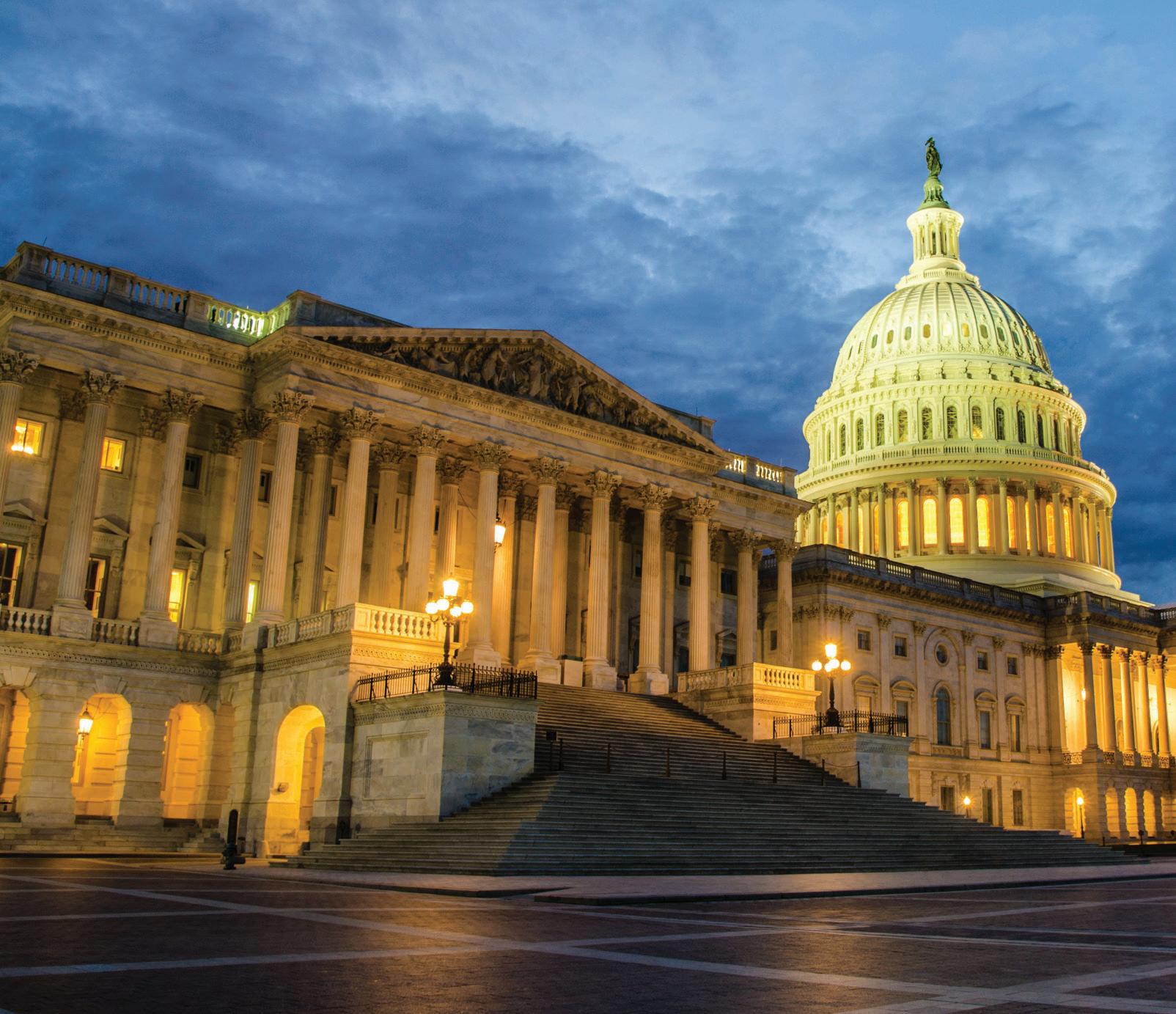

Ready to optimize your special education program? TASB Student Solutions’ comprehensive program reviews provide clear insights and data-driven recommendations tailored to your district — helping you make informed decisions and strengthen support for students.
Plan ahead and build a stronger foundation for success.
by Alicia Sebastian
Editor’s notes: The District Voices column features opinion articles written by education leaders from around Texas. Send submissions to managing editor Laura Tolley at laura.tolley@tasb.org
When I was elected as the first African American woman to serve as president of the San Antonio ISD Board of Trustees, I knew this moment was not just about me — it was about our students, our families, and the generations of leaders who paved the way.
Representation matters, and while I carry the weight of being the “first,” I also recognize the opportunity it provides to inspire others and to expand what is possible for our students.
Growing up in New Orleans public schools, I witnessed firsthand how education can both limit and unlock opportunity. Those experiences shaped my belief that every child deserves equitable access to high-quality learning environments, no matter their ZIP code. As a trustee, and now as board president, my commitment is to ensure that our decisions always keep students at the center.
Being “the first” brings with it both responsibility and perspective. I often reflect on what it means for our young people — especially our Black and brown students — to see themselves reflected in leadership. It reminds me that achievement is not only measured by test scores but also by the confidence, curiosity, and resilience we help cultivate in them. My role allows me to push our district forward, not just through policy and governance, but also by embodying what it means to break barriers and create pathways for others to follow.
At San Antonio ISD, we have established ambitious board goals that keep us focused on student outcomes. We aim to increase literacy achievement, moving the percentage of students meeting grade level in English Language Arts from 39% in 2023 to 50% by 2027.
We are equally committed to equity in math, with a focus on raising the achievement of Black students from 30% to 50% during that same time frame. For graduates receiving special education services, we are determined to improve college readiness, growing from 4% in 2022 to 30% by 2027.
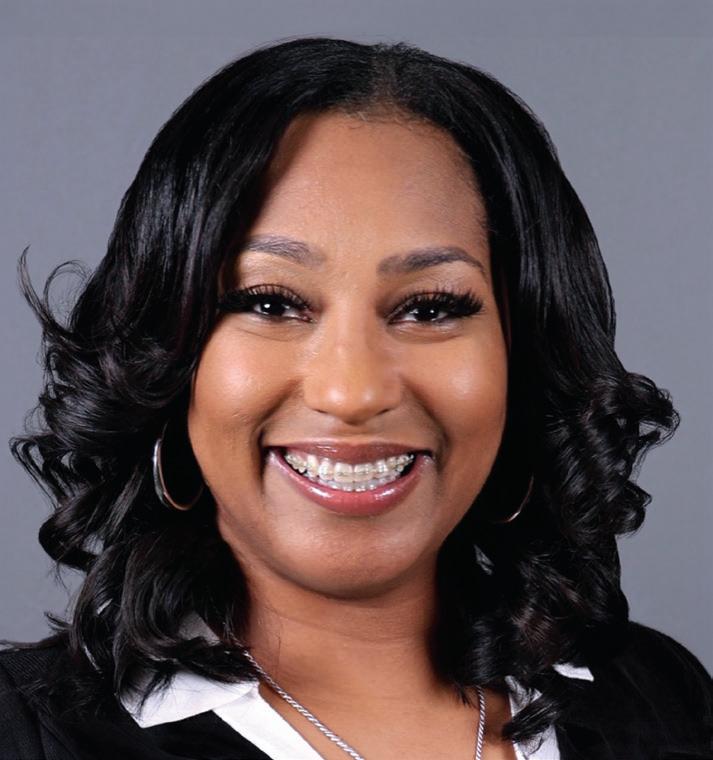
And we are working to develop the whole child, establishing measures of social-emotional readiness that will ensure our students are prepared not only for school, but for life.
We strongly believe that if we lift one student, we lift all students. This means that once we find the strategy that works for one student population, we believe we can apply it to benefit all students.
Alongside these goals, our board has adopted guardrails that define how we

My role allows me to push our district forward, not just through policy and governance, but also by embodying what it means to break barriers and create pathways for others to follow.
govern and hold ourselves accountable. We require that all major decisions include authentic engagement from students, staff, families, and community. We are committed to ensuring every neighborhood has access to a high-quality school. We have prioritized the safety and well-being of our students and staff, and we will not allow schools to be funded in ways that undermine transformational learning. These commitments keep our focus on what matters most — student success.
Our declaration as a board is simple but profound: San Antonio ISD aspires to be an inclusive familia that makes the impossible possible by demonstrating an urgent and relentless commitment to love, nurture, and teach all our students as if they are our own.
As I look ahead, I carry with me the lessons of history and the aspirations of the future. My hope is that my presidency demonstrates that progress in public education comes when diverse perspectives are valued and when we lead with both courage and compassion. Our vision is bold, but so are our students — and their success is the legacy we are determined to leave.H
Alicia Sebastian is president of the San Antonio ISD school board. The district serves about 44,000 students in San Antonio.
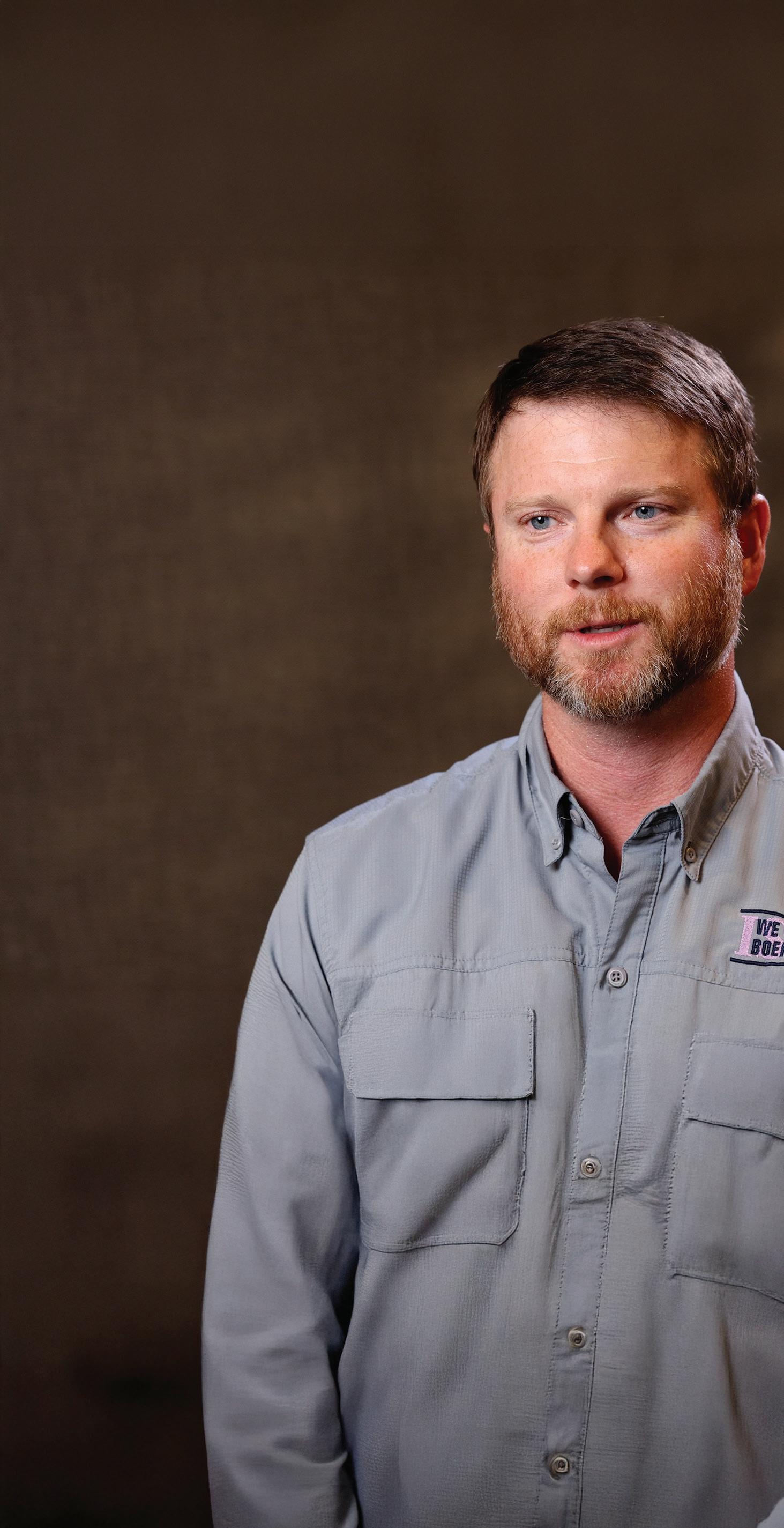
It was important that we get the right person right from the jump. I can’t say that would have happened without ESS and TASB. I think that you guys really played a big part in helping us do that so perfectly. And now we’ve got the perfect superintendent.
In its more than 30-year history, ESS has conducted over 800 searches on behalf of districts across Texas.
With a team of search consultants who know Texas and its diverse school districts, ESS has proven itself to be the go-to search firm for leadership recruiting.
ESS brings experience to the table and a guarantee, so trustees can feel confident they’ve found the best leader for the job.
by Sylvia Wood
Roosevelt Nivens of Lamar Consolidated ISD was named TASB’s Superintendent of the Year at txEDCON in Houston.
Nivens, whose district is in ESC Region 4, was selected for the top honor from a group of five state finalists that included Eddie Hesseltine, Orange Grove ISD, Region 2; Colin Howeth, Knox City-O’Brien CISD, Region 9; Lori Rapp, Lewisville ISD, Region 11; and Kurt Ashmore, Wellington ISD, Region 16.
The TASB Member Services Committee said it selected Nivens as this year’s winner, noting his innovative approach to learning, his support for teachers as the key to improving instruction and student outcomes, and his recognition of public education as a way to change generations.
“The Superintendent of the Year program highlights the amazing talent among superintendents across Texas, no matter the size or location of the district,” said Mark Lukert, chair of the Member Services Committee, a TASB Director, and a trustee from Wichita Falls ISD. “The committee was deeply impressed with all of the finalists, and making a decision was extremely difficult. Their vision, perseverance, and student-centered leadership is an inspiration. We are proud to recognize their work across Texas in building strong public schools and brighter futures for students.”
Sponsored by TASB and underwritten by Balfour, the SOTY program has recognized exemplary superintendents for excellence and achievement in educational leadership since 1984.
Candidates are chosen for their strong leadership skills, dedication to improving educational quality, ability to
build effective employee relations, student performance, and commitment to public involvement in education. The district of the SOTY winner receives a $5,000 check, and the superintendent is given a custom ring. The districts of each of the finalists receive $1,000, also given by Balfour.
Nivens has served since 2021 as superintendent of Lamar CISD, one of the fastest-growing districts in the state, spanning 385 square miles and serving nearly 49,000 students in Fort Bend County, southwest of the Houston metropolitan area.
At the Sept. 12 awards ceremony, Nivens said he was humbled to receive the
honor, and he thanked the TASB selection committee, as well as his family and the entire Lamar CISD team for the honor.
He also recognized the importance of the work of all the public education leaders in the audience, noting his own educational experience and how one teacher changed his life.
“Every day you walk into the boardroom, every day you walk into the office, every day you walk into the classroom, remember there’s a young person in there that is thirsty and hungry for you to see them and to help them,” he said. “That’s what we do as educators. This is our purpose. And our purpose isn’t what we do. Our purpose is what happens to others when we do what we do.”

across Texas
SOTY is a highlight of txEDCON, held each year in the fall to promote excellence in Texas public education.
This year’s regional superintendents of the year, in order of ESC, are:
• Region 1: Angela Dominguez, Donna ISD
• Region 5: Shannon Allen, Beaumont ISD
• Region 6: Adrian Johnson, Hearne ISD
• Region 7: Lamond Dean, Chapel Hill ISD
• Region 8: Jason Harris, Atlanta ISD
• Region 10: Mike Waldrip, Frisco ISD
• Region 12: Andrew Miller, Moody ISD
• Region 13: Mark Estrada, Lockhart ISD
• Region 14: Larry Polk, Colorado ISD
• Region 15: Amanda Traylor, Veribest ISD
• Region 19: Jose Franco, Fort Hancock ISD
• Region 20: Gerardo Soto, Harlandale ISDH
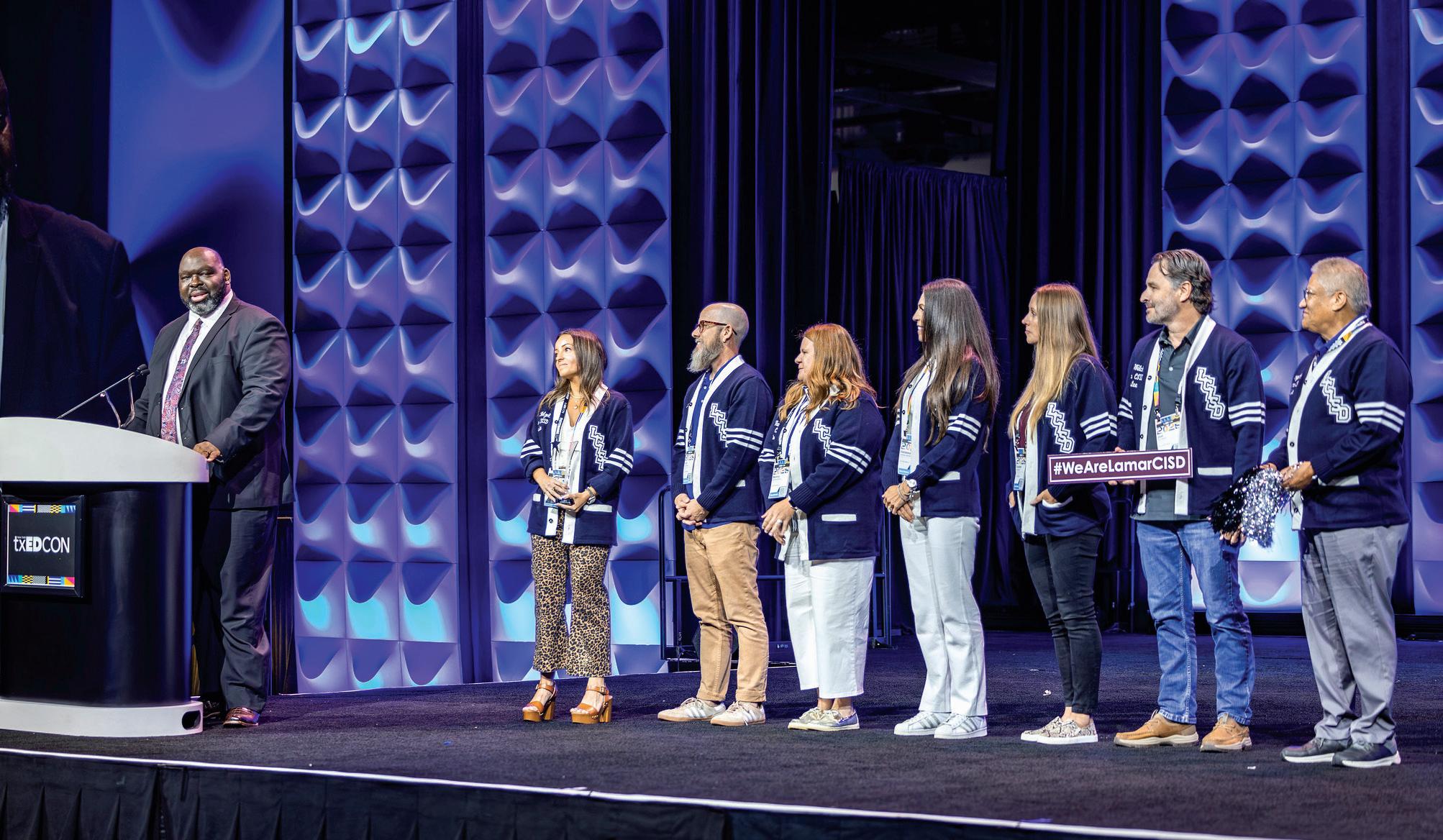


by Beth Griesmer and Laura Tolley
The txEDCON audience fell silent as Kerrville ISD students gave an emotional performance honoring the lives lost in the tragic flooding this summer and the heroic recovery efforts to help those in need.
“The fact that this performance is happening today is a testament to the strength, resilience, courage, and faith of our Kerrville ISD family in a time of unimaginable crisis that seems to have spared no one in our state from immeasurable pain,” said then-TASB
President Rolinda Schmidt, a longtime Kerrville ISD trustee.
Kerrville ISD students opened with a moving rendition of the national anthem and took the assembled school leaders through the importance of the Guadalupe River to Kerrville’s history. They proclaimed that the events of the river’s flooding on July 4 “only made us stronger.”
Their powerful performance came on the first full day of activities at txEDCON, which was held Sept. 11-14 in Houston. The annual gathering of school leaders from across Texas also featured dozens of breakout sessions, general session speakers, key leadership awards, a busy exhibit hall, and special training events, including the Texas Trustee Institute and Board Officer Institute.
“I never come away disappointed,” said Cornelia Goffney, a New Waverly ISD trustee. Goffney, whose district serves about 1,000 students in a town of the same name between Houston and Huntsville, attended the Small School District Seminar at the convention’s start as well as breakout sessions and other activities.
Training, speakers, and more
A total of 4,504 people attended the conference, earning 11,427 hours in continuing education credit. The gathering was hosted by TASB and the Texas Association of School Administrators.
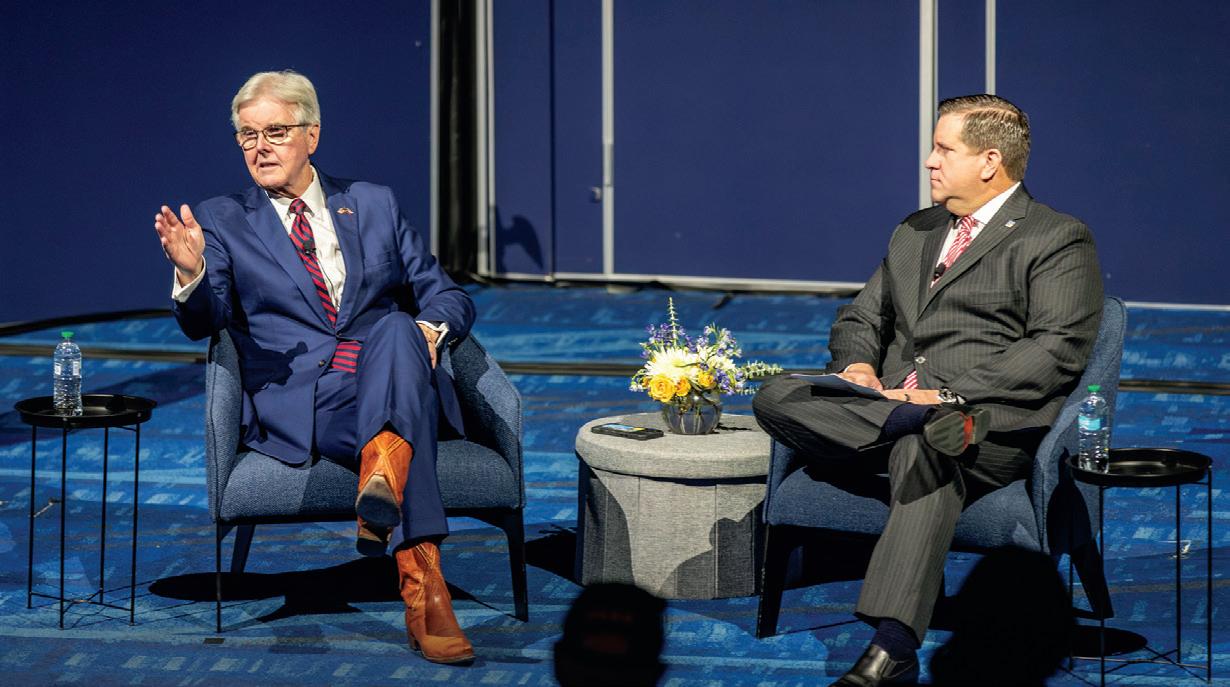
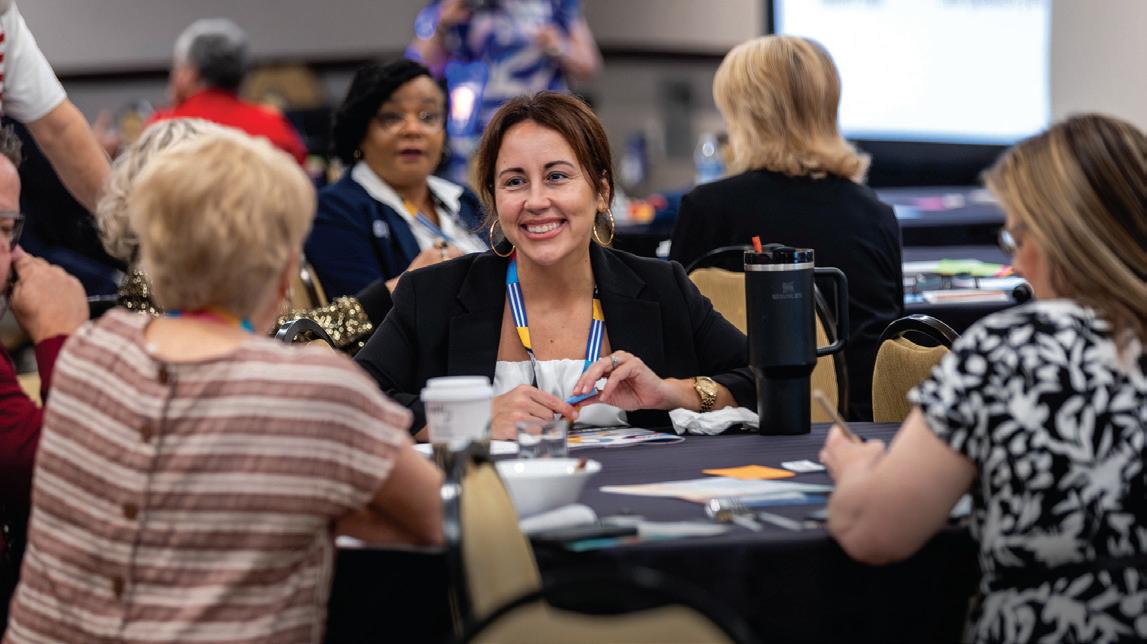
The conference also included motivational speakers and featured two top state leaders — Lt. Gov. Dan Patrick and Texas Commissioner of Education Mike Morath.
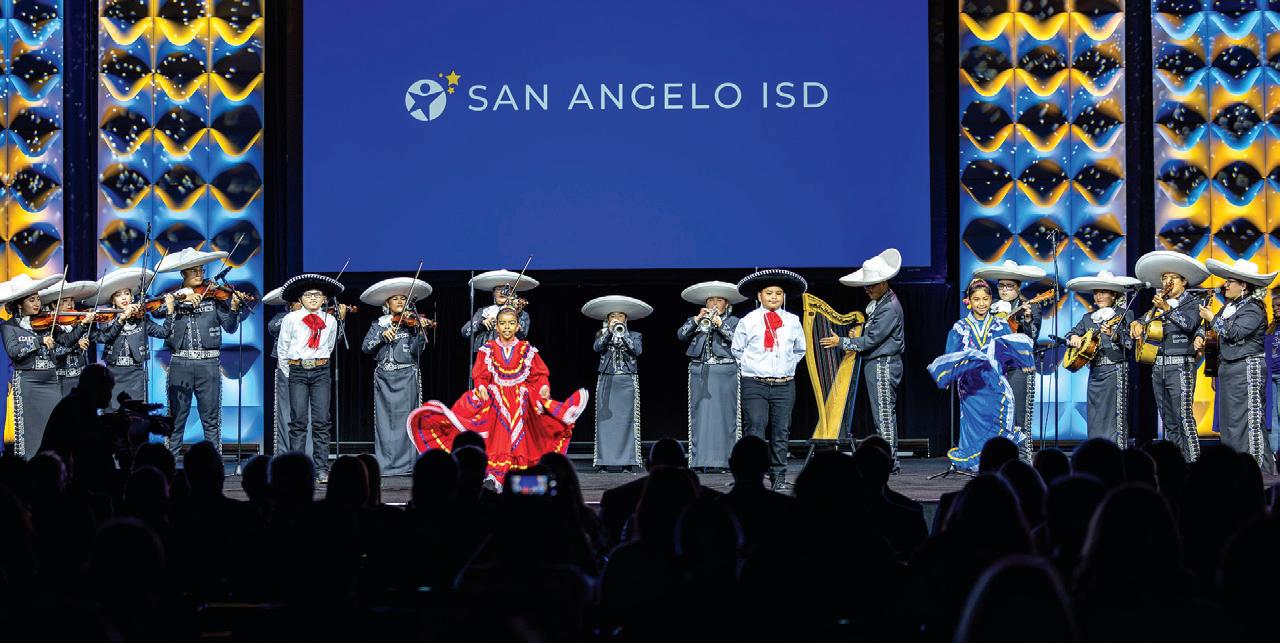
A conversation between Patrick and then-TASB President-elect Tony Hopkins spanned a number of education topics, including a new testing schedule and how public schools can support the Texas workforce.
“It’s really important that we have dialogue together between our school districts and the Legislature,” Patrick said in his opening remarks. He talked about how Texas is unique in its 1,024 school districts, but having so many superintendents and school boards can make conversations difficult. “That’s why TASA and TASB are important associations that we need to have communication with.”
Morath, who closed out the second day of the conference, told the audience, “You are the most important leaders in our country.” He also touted the benefits of higher pay for Texas
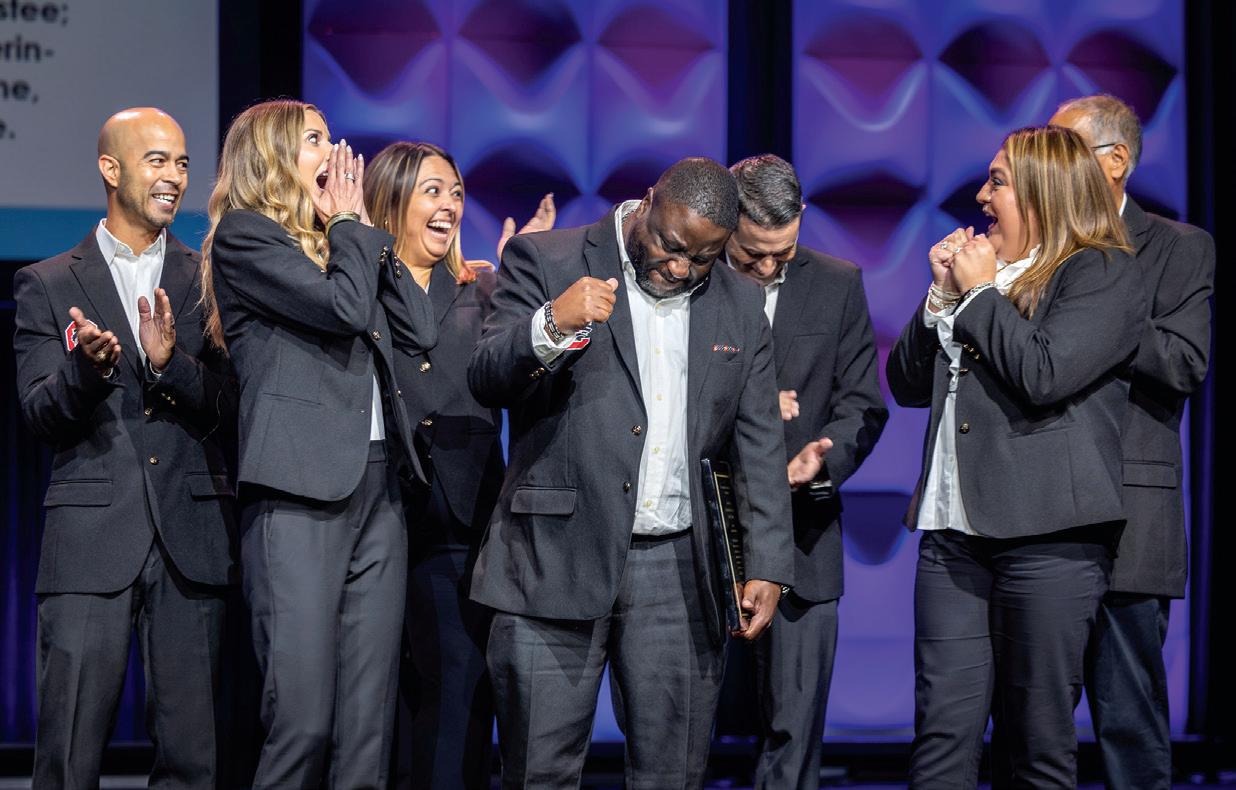
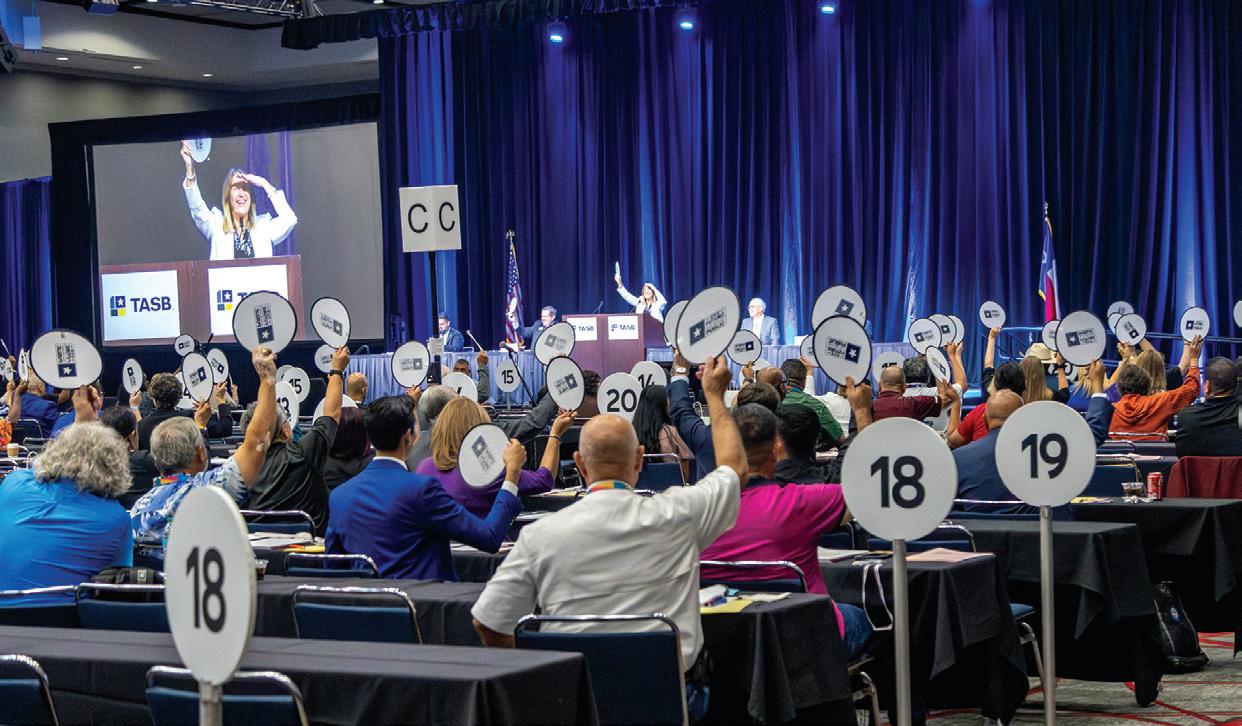
teachers through the Teacher Incentive Allotment. “It is part of a movement to support those that are the single most important factor in our schools and improving student learning.”
The general sessions featured several awards announcements, including TASB’s Superintendent of the Year honor. All the SOTY regional winners and five finalists joined the stage just before Roosevelt Nivens of Lamar Consolidated ISD was named the SOTY winner. Nivens, with tears, spoke of the teacher who changed his life. “What we do is very challenging and it gets tiring. And all you hear are the negative comments. I’m standing up here right now because of you, because of educators like you, and school board members like you.”
The next day, Colorado ISD was honored as TASA’s 2025 Outstanding School Board. The district in Central West Texas serves about 900 students in Colorado City, the county seat of Mitchell County. “Our team of eight puts in countless hours and misses family activities to do what we do,” said Colorado ISD Board President Emily Strain.
And Temple ISD Superintendent Bobby Ott was named the Texas School Public Relations Association’s 2025 Key Communicator.
“This award is not for me. This award is for all of those in the arena. It’s for the real MVPs that work so hard,” Ott said, referring to the work of teachers, bus drivers, and campus staff. “These are the content generators that make our jobs of telling the story easy. And every one of them should be respected, celebrated, held up, and recognized.”
The breakout sessions, many of which were hosted by Texas school leaders, offered a range of public education topics, from empowering students and teachers to effectively communicating with the community to making the difficult decisions to close schools.
Kelly Marwill, at her second txEDCON, found a session by Pearland ISD and Raise Your Hand Texas on listening circles interesting and informative. “That one I loved,” said Marwill, an Eanes ISD trustee, after attending Listen Up: Building Trust Through Listening Circles.
“As leaders, to problem-solve, we have to really listen to parents and other community members] to really understand what’s going on.” Marwill, a nurse first elected to the board in May 2024, believes in the benefits of this work. “It helps people feel heard,” said Marwill, whose district is located in the Austin area.
The convention also was the site for Delegate Assembly, TASB’s annual business meeting held each year, where Delegates discuss and vote on a number of action items and elect officers. Hopkins became TASB President as Schmidt handed him the gavel, officially moving into her role as TASB Immediate Past President. As active members, each local school board and ESC has the right to appoint a delegate and alternate to represent their board and community.
The delegate from Liberty-Eylau ISD, James Keeton, has served his district southwest of Texarkana as a trustee for 29 years. His entire board made it to txEDCON, and he was happy to be the one designated to take part in Delegate Assembly.
“It’s important to show up and have a voice,” he said.
Keeton has attended many board trainings over the years, but he said txEDCON is uniquely important.
“It’s the camaraderie,” he said, adding that he appreciated seeing how other districts do things and gaining insights and new ideas to take back to his district.
That camaraderie was on full display on a shuttle bus back to the hotel on Friday evening. Members of the Fort Hancock ISD board, looking sharp in their matching gear representing their small district 50 miles southeast of El Paso, talked about starting their day early at the Small School District Seminar and different sessions they attended throughout the day.
They laughed as they tried to agree on dinner plans. One thing they could all agree on was that it had been a good day.
“I’m tired,” said Fermin Muñoz, board vice president. “But it was worth it.”H
Beth Griesmer is a staff writer for Texas Lone Star. Laura Tolley is managing editor of Texas Lone Star.
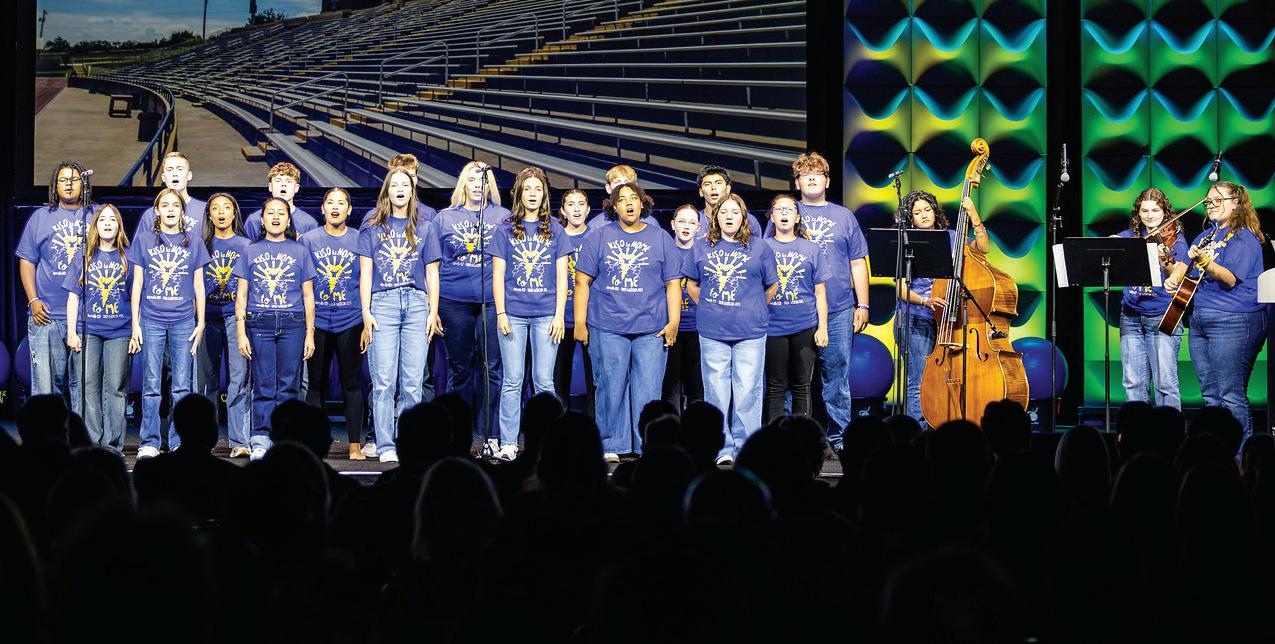
by Mary Ann Lopez
Editor’s note: Leadership TASB is a unique board development program designed to take experienced board members to a new level of service and leadership by introducing them to a variety of issues, people, activities, and locations.
The Leadership TASB Class of 2026 gathered for its inaugural meeting in Houston ready to embark on a yearlong journey that will have the 32 members traveling thousands of miles across the state in service to their districts, communities, and students.
Every year, the class launches during txEDCON, and this year the program kicked off with learning, connecting, and district visits. The first district site visits were to Lamar Consolidated ISD and Royal ISD, both in the Houston metro area.
“It’s been far beyond my expectations,” Ron Franklin, a trustee from Eagle Mountain-Saginaw ISD in Fort Worth, said of the cohort’s morning visit to Lamar CISD. “The biggest takeaway for me was how engaging the kids have been.”
For over 30 years, LTASB has proven to be the premier school board trustee training program in Texas, with more
than 1,000 Master Trustees having completed the program. This year, members will visit Harlingen, Amarillo, and Texarkana, with their final meeting in Fort Worth, where upon successful completion of the program they will graduate and earn the Master Trustee designation.
“School visits are an extremely impactful part of the LTASB program experience,” said Robert Long III, LTASB program manager and Board Development Services division director. “The on-site tours really drive home the opportunities districts have that allow them to meet challenges and find innovative solutions. Each LTASB member gains insights and key takeaways from the experience.”
The work begins
The Class of 2026 program began Wednesday with a day of connection and norming, where the trustees learned more about program expectations, while they also began bonding with each other.
After the introductory day, which allowed the group to gain their footing, the cohort got right into the heart of the program making on-site school visits.
The trustees began their day Thursday in Rosenberg at Lamar CISD, where they were welcomed by students and staff and toured Tomas High School, Banks Junior High School, and Fagert Elementary School.
“The on-site tours really drive home the opportunities districts have that allow them to meet challenges and find innovative solutions. Each LTASB member gains insights and key takeaways from the experience.”
— Robert Long III, LTASB program manager and Board Development Services division director
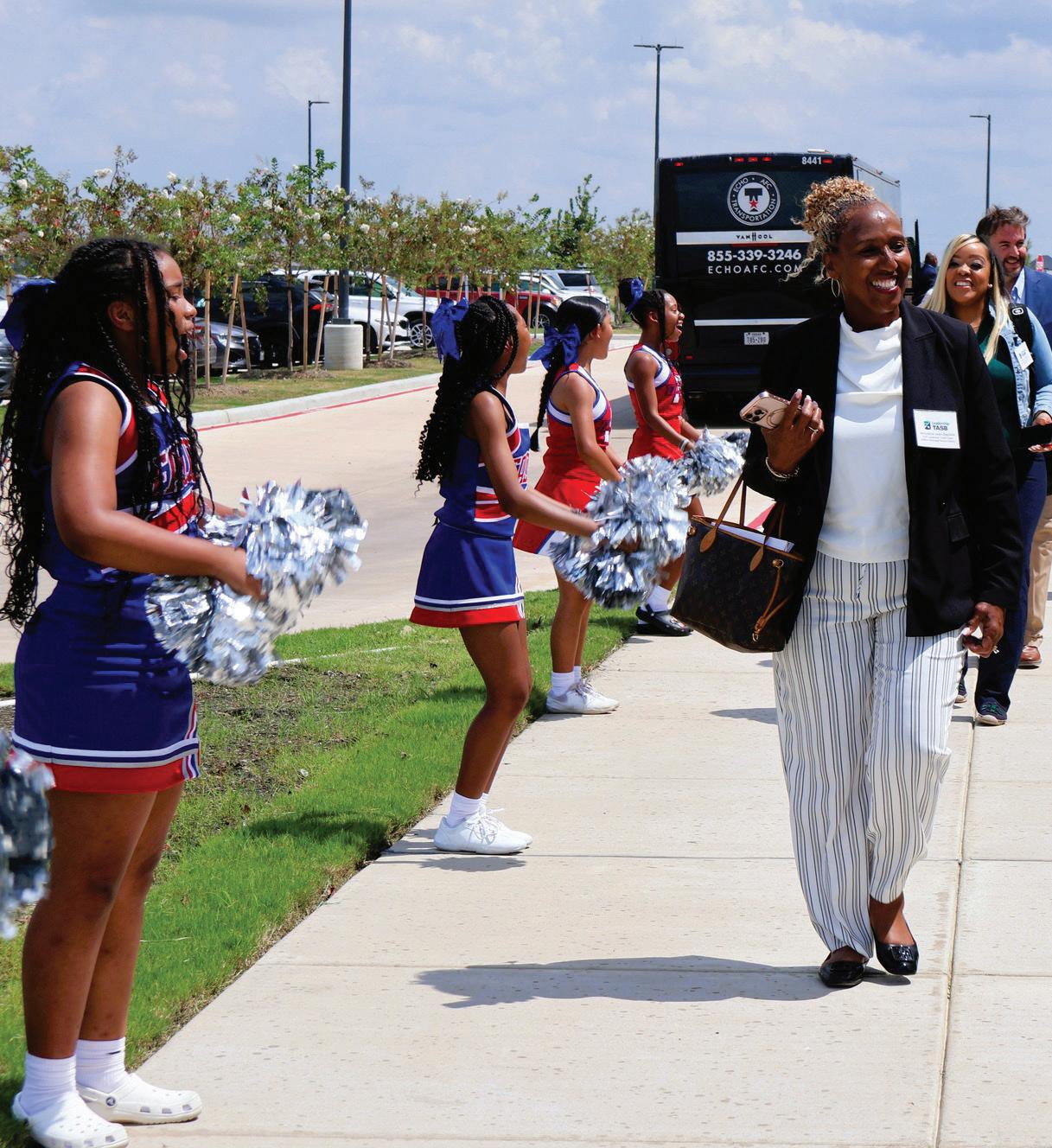
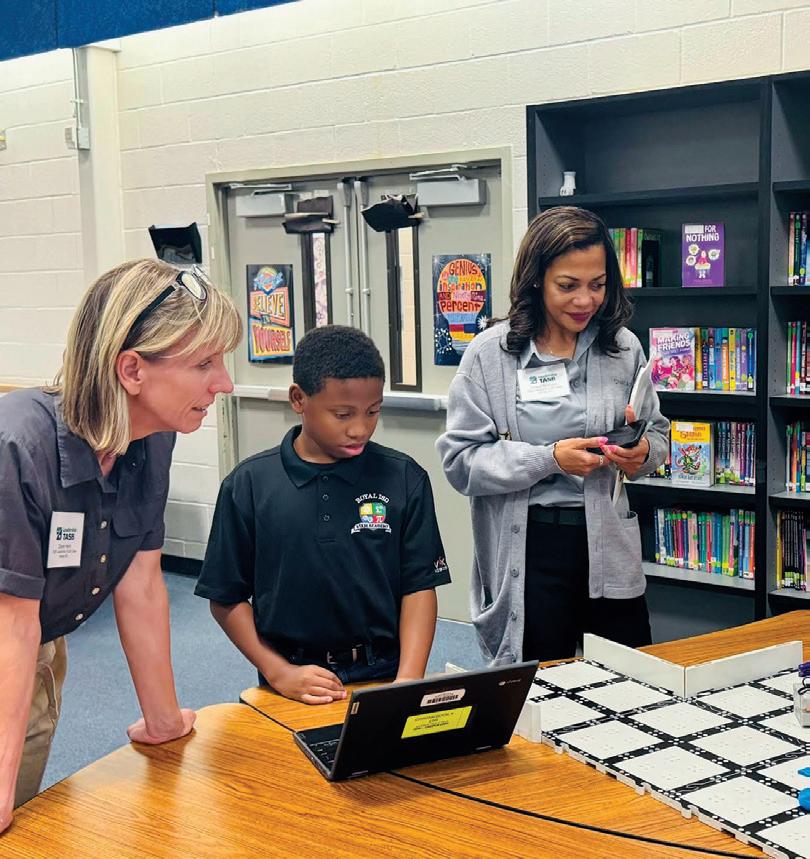
After the morning visit, the group boarded a bus and headed about 30 miles northwest to Royal ISD in Pattison, where trustees made their first stop at Royal Prairie Elementary School, a brand-new school and the district’s first in Katy.
The school just opened in August. The trustees were greeted by students, staff, and administrators. While trustees were easing into the new experience, they were also thoroughly engaged.
“It’s been awesome learning about the different districts and what’s happening with education here in Texas,” said LTASB class member Denishea Williams, a trustee at Cedar Hill ISD, a district about 17 miles southwest of Dallas.
District leaders prepared a packed schedule for the trustees, starting with a presentation that explained how Royal ISD is preparing for growth, dealing with recapture, creating a culture that captures kids’ hearts, and building a strong leadership team and school community.
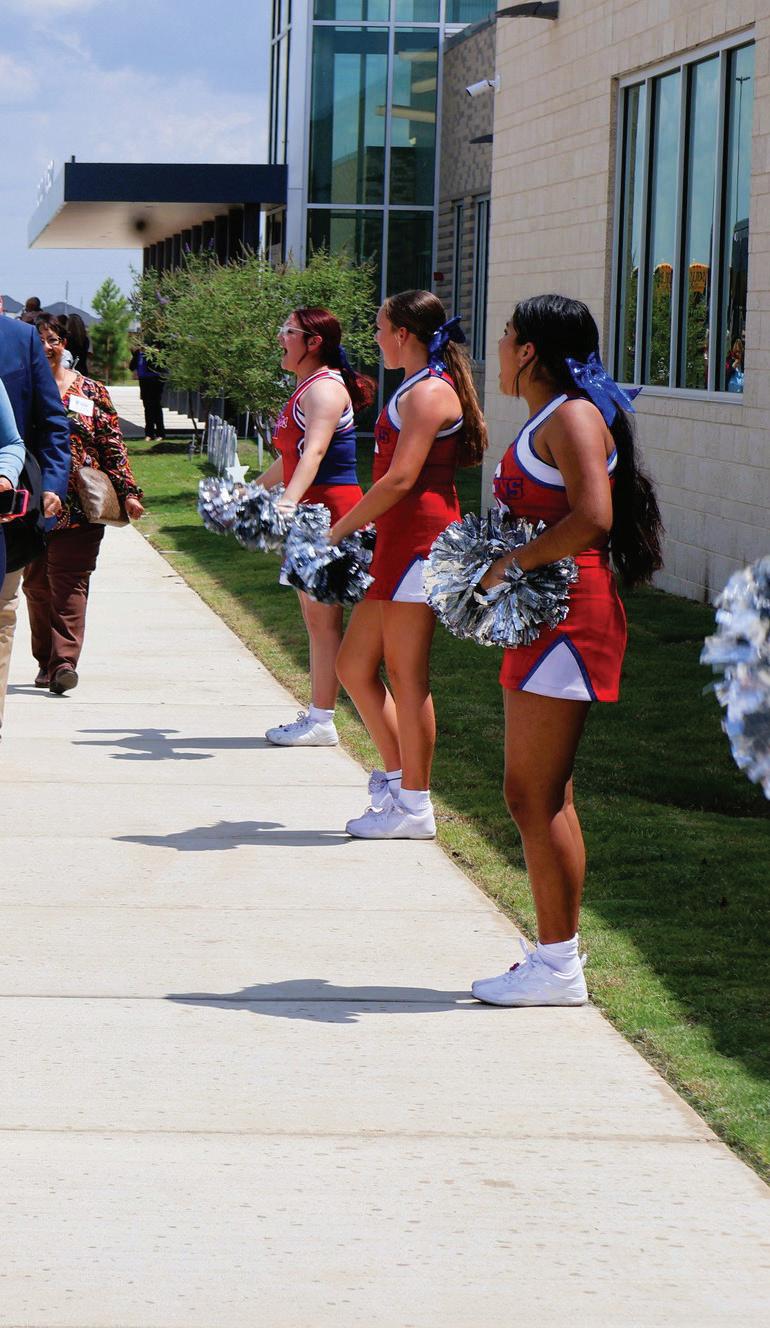
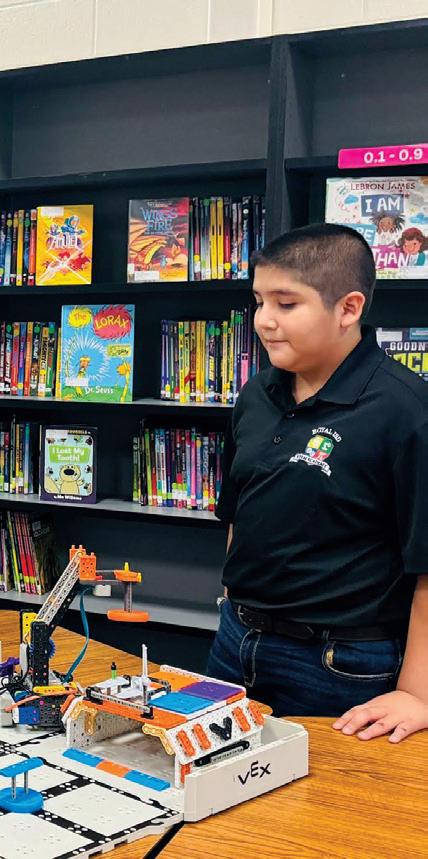
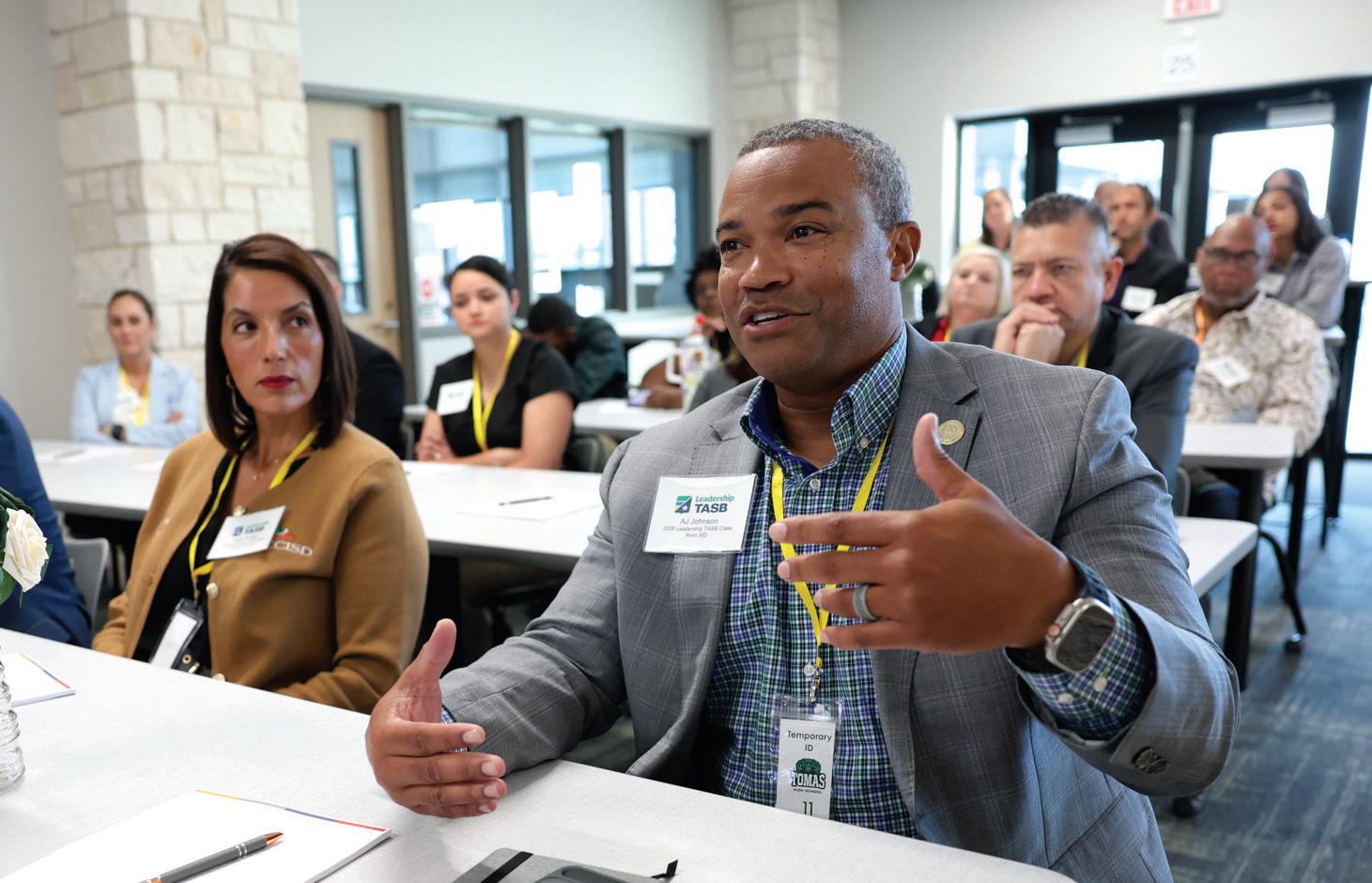
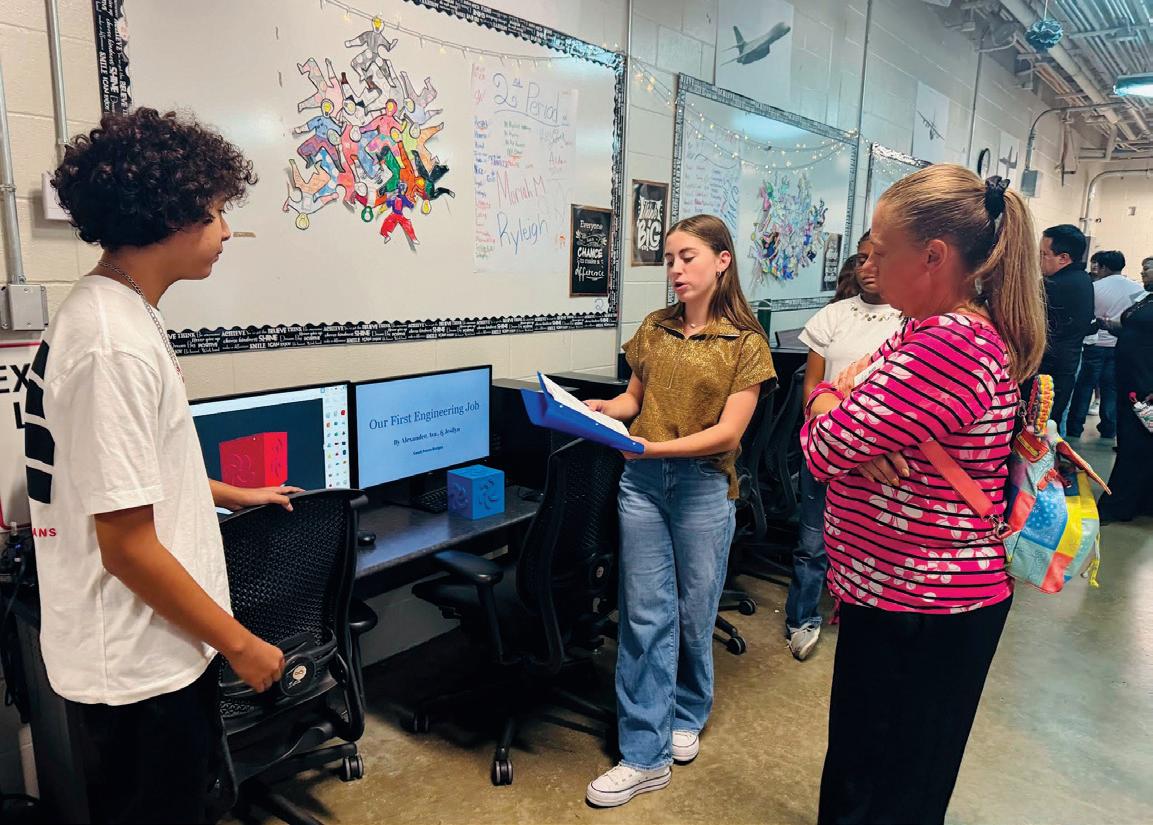

A: The LTASB Class of 2026 receives a warm welcome at Royal Prairie Elementary School.
B: LTASB members Diane Hearne, Eanes ISD, and Chasiti McKissic, board president at DeSoto ISD, chat with robotics students at Royal STEM Academy.
C: Trustees learned more about Lamar CISD and its culture during a visit to the district.
D: Project Lead the Way students at Royal STEM Academy explain their class project to Monica Ryan, board president at Judson ISD.
E: Trustees watch while Royal Prairie Elementary School students enjoy participating in a dance activity.
Members of the Leadership TASB Class of 2026 are:
• Matthew Aguilar, Pearsall ISD
• Lynn Boswell, Austin ISD
• Ester Cardoza-Wade, Monte Alto ISD
• Jason Choate, Cooper ISD
• Ariel Cruz, San Benito CISD
• Ron Franklin, Eagle MountainSaginaw ISD
• Ginger Friesenhahn, East Central ISD
• Becky Gonzales, PecosBarstow-Toyah ISD
• Katherine Goodwin, Plano ISD
• Diane Hern, Eanes ISD
• James Hernandez, Edgewood ISD-Bexar County
• Jacqueline Jean-Baptiste, Stafford Municipal School District
• Jose Jimenez, Galena Park ISD
• Albert Johnson III, Alvin ISD
• Kathryn Knotts, North Zulch ISD
• Kristi Littleton, Port Aransas ISD
• Lorenzo Luevano, San Elizario ISD
• James Matlock, Hutto ISD
• Chasiti McKissic, DeSoto ISD
• Amber Moffitt, Grand Prairie ISD
• Alex Payson, Marble Falls ISD
• Benita Reed, Mansfield ISD
• Mary Richarte, Irving ISD
• Priscilla Ruiz, Bastrop ISD
• Monica Ryan, Judson ISD
• Meagan Sullivan, Sharyland ISD
• Anji Taylor, Greenville ISD
• Clinton Temple, Little CypressMauriceville CISD
• Dolly Trolley, Corpus Christi ISD
• Jessica Ward, Midlothian ISD
• Denishea Williams, Cedar Hill ISD
• Tommy Wilson Sr., West OrangeCove CISD
Royal ISD is now a fast-growth district, Superintendent Megan Pape said. In August, the district surpassed 3,000 students and is expected to have 9,000-11,000 students by 2030. All of that expected growth requires the district to think strategically and to take action to prepare for the future.
After the introduction to the district, the trustees split into two groups to visit classrooms. They observed students in the fine arts and flexible learning spaces. In one of the classrooms, students were participating in a dance class, and in the flexible learning space, students were using the story of The Three Little Pigs to gain a better understanding of the English language and its structure.
During the dance class, the goal was to switch between partners without being eliminated until only one dancer remained on the floor. When the tour guide asked the group what they observed about the students, the trustees responded that they were all engaged and seemed connected to and supportive of each other.
The final stop of the day was at Royal STEM Academy where the trustees learned how Project Lead the Way is helping students be college and career ready. They spoke with students about the projects they were undertaking and watched robotics in action.
After the classroom visits, the trustees heard from a panel of teachers who shared how things in the district have changed over time and steps they’ve taken to build a culture of caring, not only with students, but also with staff. The district gifted the class members with engraved tumblers with a special LTASB/Royal ISD design, and they also received a copy of Ron Clark’s book Move Your Bus
“I am feeling even more inspired as a board member, seeing all the ways we can support students,” said Chasiti McKissic, board president at DeSoto ISD, which is about 16 miles south of Dallas. “It makes me excited to see what can I do to advocate at the state level to support our schools and students.”
McKissic said she is looking forward to learning more about how she can not only advocate on behalf of public schools and students but to find ways to get legislators into the classrooms, “to give them a better idea of what is going on in education and give them a real world experience.”H
Mary Ann Lopez is a staff writer for Texas Lone Star.
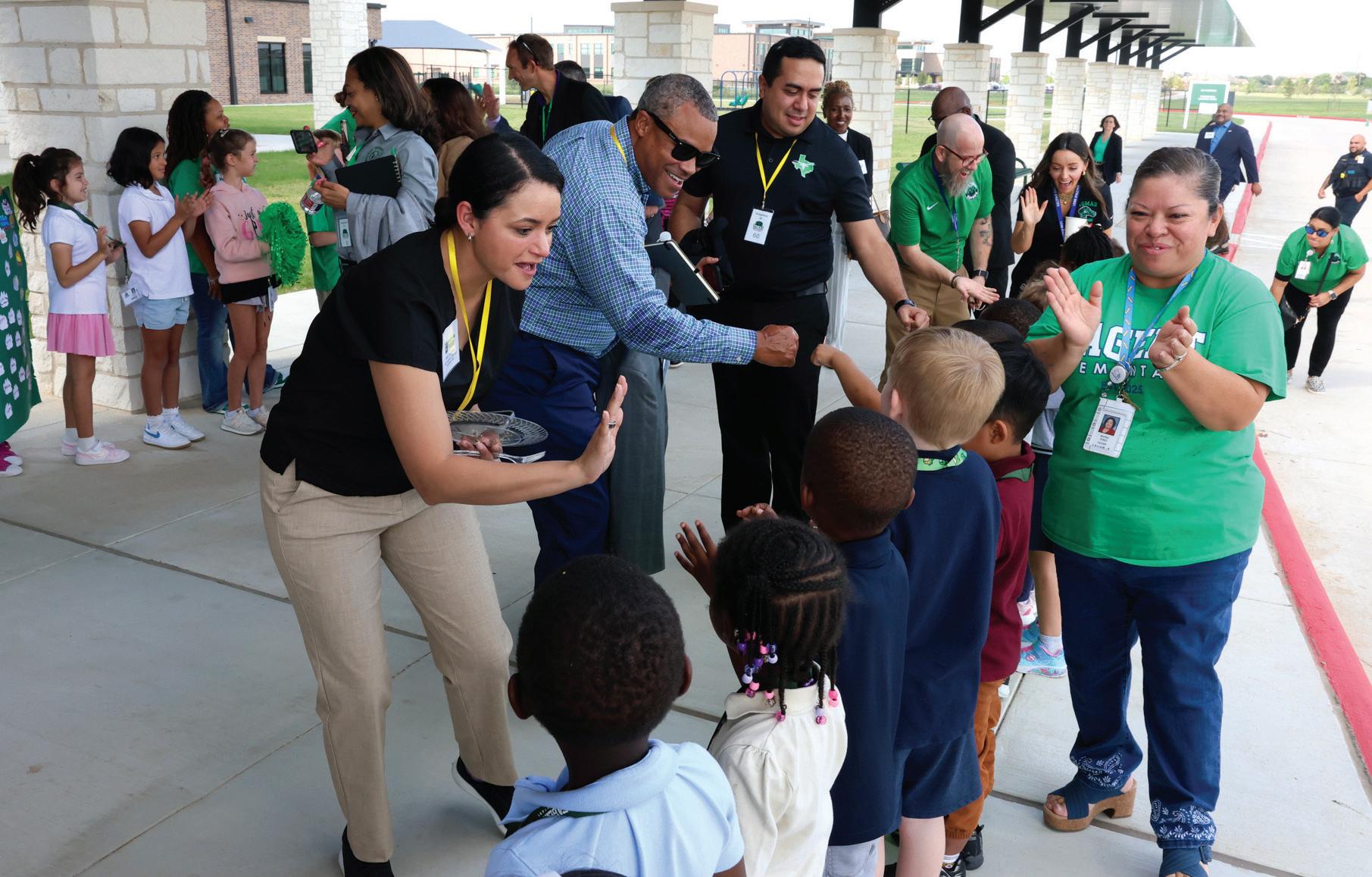
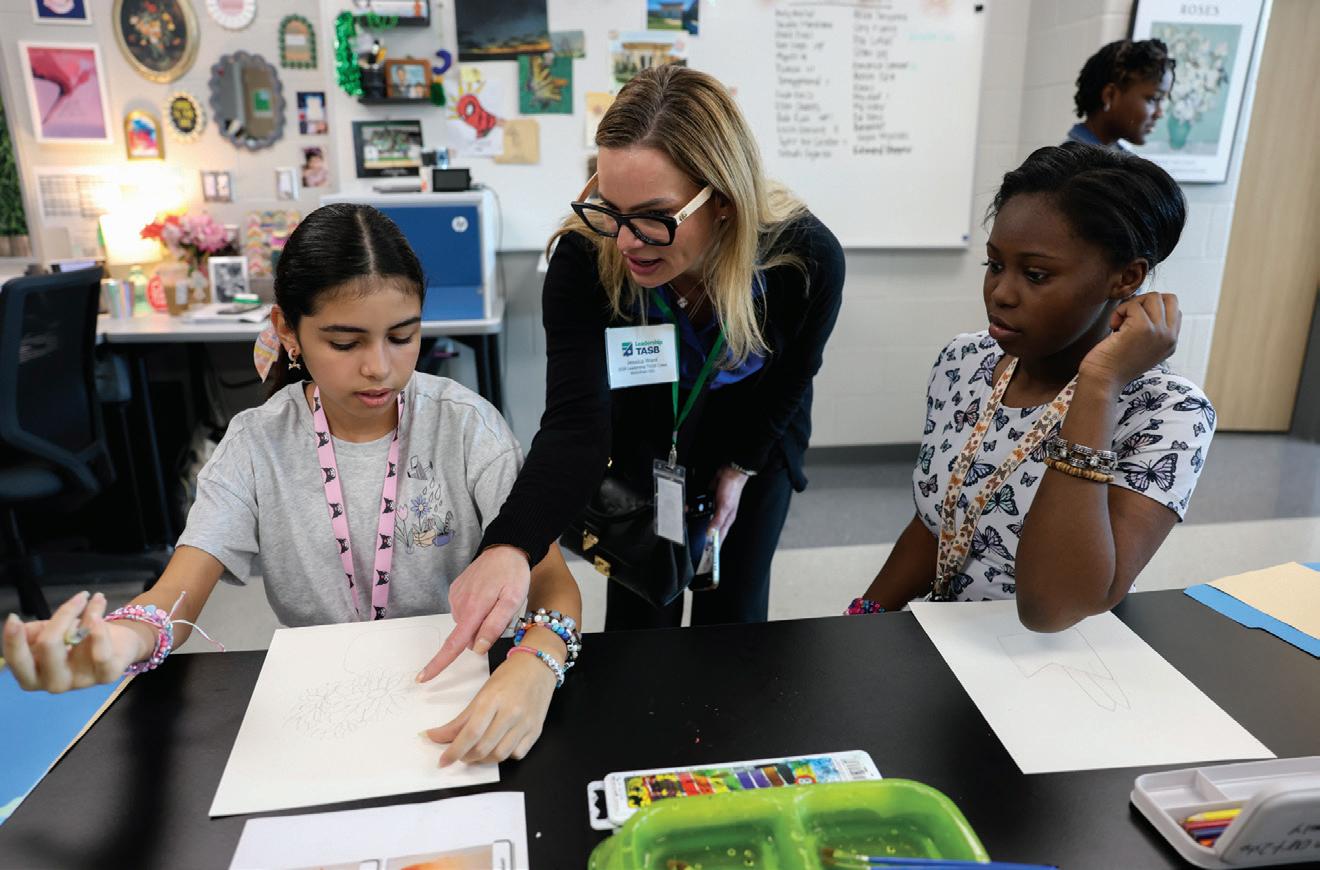




With competitively procured contracts that meet state and local requirements, your district can buy with confidence. Make your procurement processes efficient, accountable, and audit-ready through BuyBoard.

by Matt Mitchell
For the fourth consecutive year, TASB is offering public school leaders the opportunity to attend the Texas Federal Advocacy Conference in Washington, D.C. Organized by TASB’s Governmental Relations team, the conference will be held Feb. 2-3, 2026, at the Willard InterContinental Hotel, and will feature informative panel discussions with public education experts and meetings with lawmakers on Capitol Hill.
“It is vital for our trustees to understand the importance of advocating with Congress on public education issues,” said Rubén Longoria, TASB director of Federal Affairs. “Recent congressional actions point to significant cuts to federal programs that school districts have historically relied on to deliver essential services. Because these policy decisions often unfold behind closed doors, trustees must remain informed and prepared for whatever actions Congress may take.”
On the first day of the conference, attendees will convene at the Willard hotel to hear panel discussions about key
topics impacting public education. On the second day, attendees will head to the U.S. Capitol to meet with congressional members and their staffs to discuss federal education policies.
Earlier this year, more than 50 public school leaders attended the 2025 conference. Many trustees have made the Texas Federal Advocacy Conference a part of their yearly rotation of TASB events, including new TASB President Tony Hopkins, who plans to attend for a fourth straight year. Hopkins, board president at Friendswood ISD, said the conference is a great opportunity for school board members to make their voices heard at the highest level of government; something that can otherwise be difficult to do.
“We’ve had a huge focus on trying to get trustees to reach out to their local state representatives and senators,” Hopkins said. “But I think our representatives at the federal level don’t hear from school board members as often as they should, so to have this arena to bring this message to their home turf is important.”
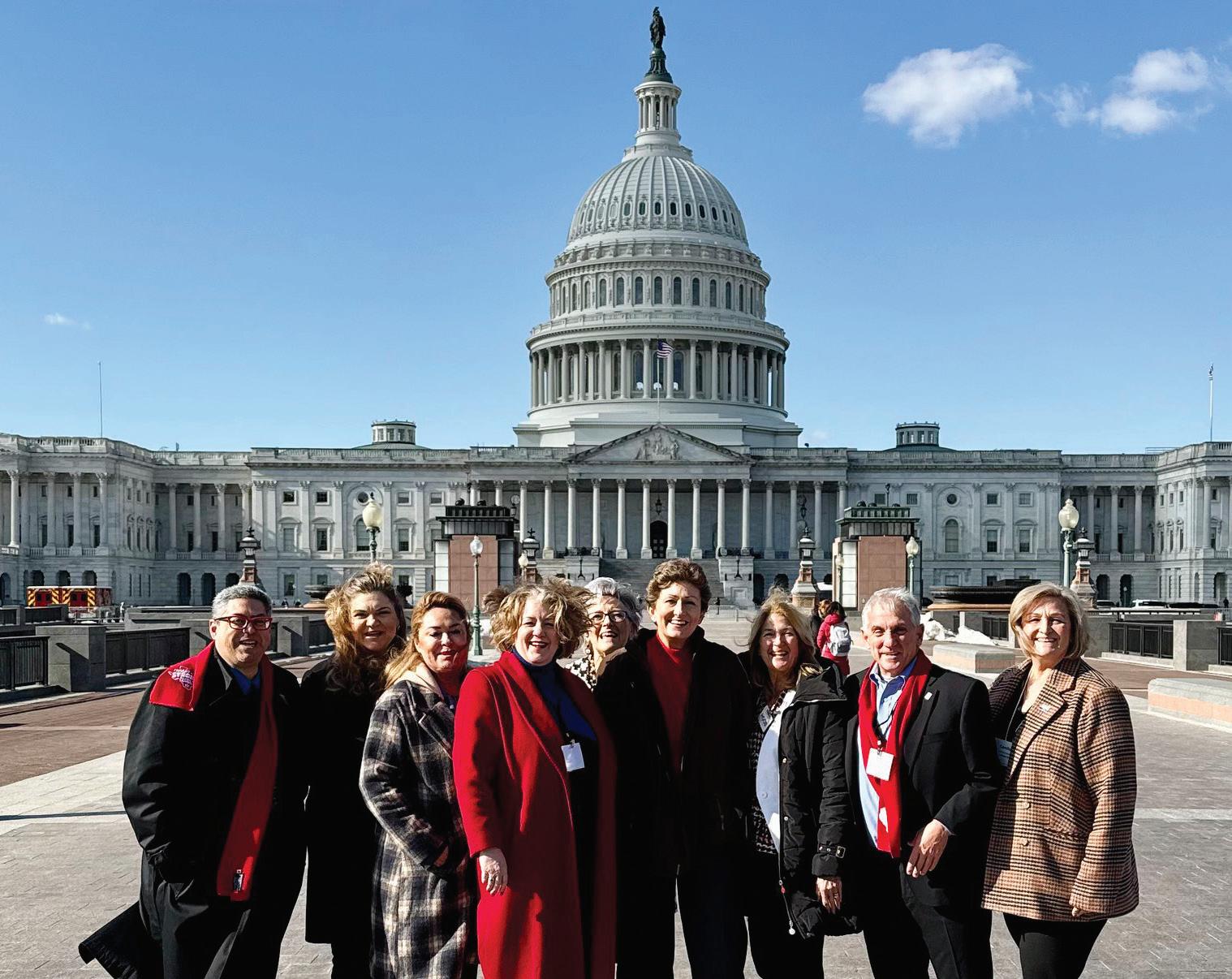
Longoria echoed Hopkins’ sentiments and stressed that these trainings and meetings will go a long way toward aiding trustees’ advocacy efforts back in Texas.
“Everything they learn in D.C. will help them back home when they’re advocating to their members of Congress or state legislators,” Longoria said. “It’s a continuing learning experience that only gets better each time they participate.”
Registration for the 2026 Texas Federal Advocacy Conference is now open.H
Matt Mitchell is a staff writer for Texas Lone Star

Scan to register and learn more about the conference.

The Texas Association of School Administrators has named the Colorado ISD Board of Trustees the 2025 Outstanding School Board — the top honor in the TASA School Board Awards program, which has honored Texas school boards that have demonstrated commitment to their students and to their communities since 1971.
The Colorado ISD school board, announced in September at txEDCON in Houston, was chosen from among five finalists interviewed by a committee of Texas school administrators. The committee was impressed by how board members have focused on opportunities to break the cycle of poverty in their community by offering high-quality career and technical education programs to students in their district.
“They raised the bar for students by educating for the future of their kids, not their past,” the committee stated, commending the board for listening to their stakeholders and responding to their needs.
The committee also noted that the board shows clear strengths in ethics, harmony, and student-centered values.
“The board is thoughtful and collaborative, with a visible focus on long-term planning, community relationships, and instructional improvement,” the committee said when selecting the board as a finalist for the award.
In his nomination of the board for this honor, Colorado ISD Superintendent Larry Polk Jr. said, “[The board’s] unwavering commitment to student performance is evident in their strong support for academic innovation. From celebrating our growing eSports team and STEM programs to backing expanded dual credit and CTE opportunities, our trustees understand that achievement takes many forms, and they support them all. … Their leadership has not only restored pride within our district, it has inspired a renewed belief in what public education can achieve.”
Colorado ISD serves about 900 students in Colorado City in ESC Region
14. Colorado City is the county seat of Mitchell County in Central West Texas.
This is the first time in the award program’s history that the Colorado ISD school board has received the Outstanding Board award or been chosen as a finalist, and the second time a board of trustees in ESC 14 has won the award. The Abilene ISD board took home the top honor in 1991.
The other four finalists for 2025 Outstanding School Board are Galena Park ISD, Region 4; Memphis ISD, Region 16; Plano ISD, Region 10; and Temple ISD, Region 12.
The 2025 Regional Honor Boards (semifinalists) and their ESC regions are Roma ISD, Region 1; Port Aransas ISD, Region 2; Orangefield ISD, Region 5; Grand Saline ISD (large district) and Overton ISD (small district), Region 7; Northwest ISD, Region 11; Round Rock ISD, Region 13; Anthony ISD (small district) and Clint ISD (large district), Region 19; and New Braunfels ISD, Region 20.H
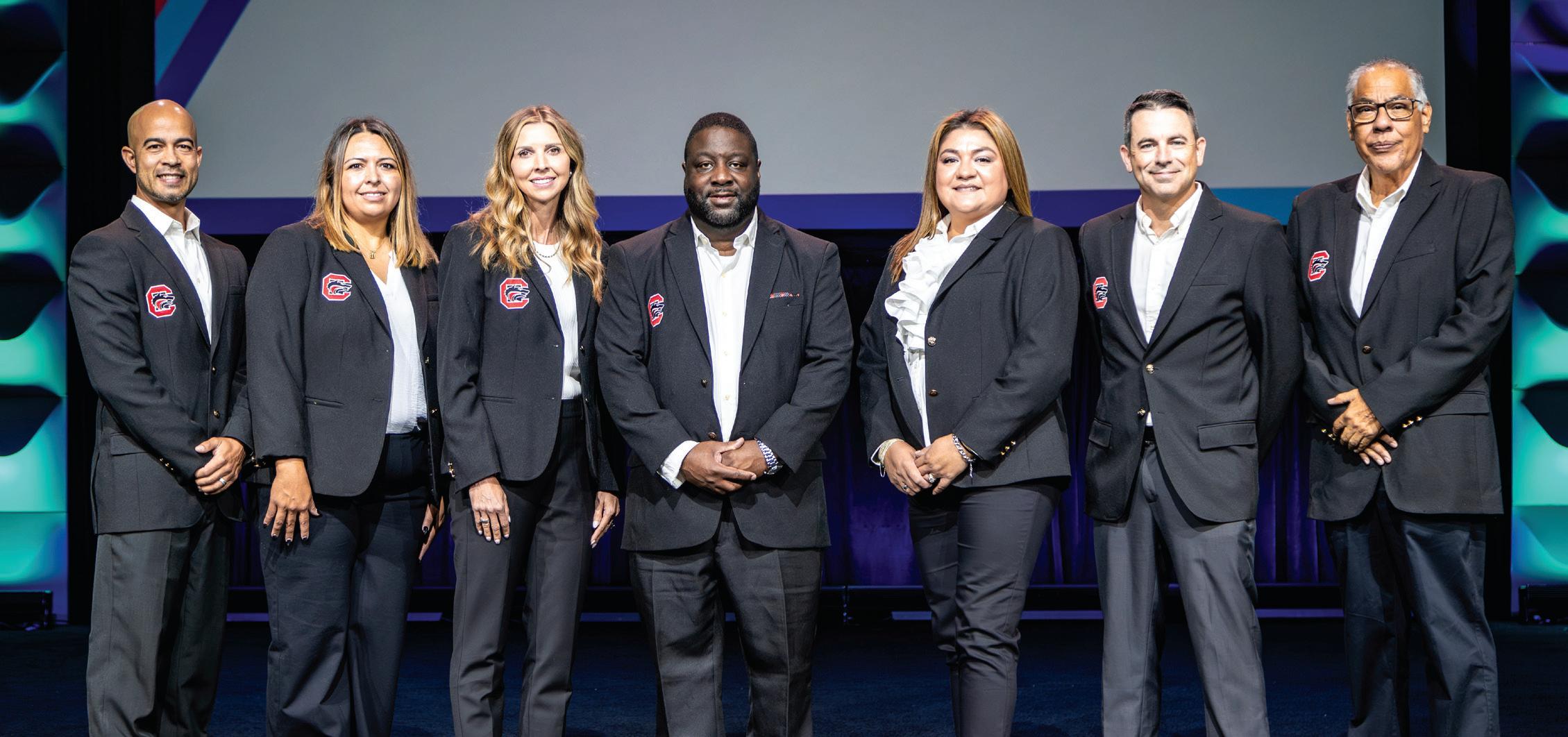
by
Unlock the power of membership. As a TASB Active Member, you gain more than resources — you join a statewide network of trusted expertise, bold advocacy, and unmatched support for school governance. TASB delivers the tools, connections, and resources to support your district.
• Quick answers from experts — legal advice just a phone call away
• Trusted tools you can count on — publications and resources
• Next-level growth — professional development designed for today’s leaders
• A stronger voice — advocacy for public education priorities at the Capitol
• Confidence in governance — resources and training that strengthen your leadership
Plus, exclusive access to powerful elective services and affiliated entity programs:
• BuyBoard® — cooperative purchasing with the buying power of thousands
• TASB Risk Management Fund™ — coverage tailored to school districts
• TASB Benefits Cooperative™ — cost-effective, quality benefits solutions
• TASB Energy Cooperative™ – smart energy strategies that save money
Your district deserves every advantage. With TASB, you gain the strength of proven expertise and programs designed to help your schools thrive.
Learn more about the TASB Advantage, including access to elective programs, services, and products designed to meet the unique needs of school districts at tasb.org or scan the code.
Gov. Greg Abbott has announced that 98 Texas public schools have been awarded the Purple Star Campus Designation for the 2025-26 school year, raising the overall total to 640 schools. The designation is awarded to schools committed to providing comprehensive support for students from military families.
In 2019, Abbott signed Senate Bill 1557 into law, establishing the Purple Star Campus Designation, which is awarded to schools that demonstrate a significant commitment to providing comprehensive support for students from military families. These campuses must meet rigorous criteria, including designating a campus-based military liaison, creating and maintaining an easily accessible campus webpage that includes required information for military-connected families, instituting a campus transition program for military-connected students, and supporting a military family initiative.
All Texas public school campuses are eligible to receive a Purple Star Designation, regardless of the size of the military-connected student population. Applications are accepted annually, with the designation lasting two years.
“Texas is home to nearly 200,000 military-connected students attending public schools across our state,” Abbott said in a Sept. 4 news release. “The Purple Star Campus Designation program encourages Texas public schools to expand resources and tools available on their campuses to meet the unique educational needs of military-connected students and their families.”
To view the list of 2025-26 Purple Star Campus designees, go to tea.texas.gov and search for Purple Star Campus 2025.
Step out of the everyday and into an experience designed to challenge, inspire, and connect at TASB’s Governance Camp March 4-7 in Galveston. Join trustees, superintendents, education leaders, and students from across Texas for an immersive learning experience designed to strengthen leadership, amplify student voice, and drive positive changes in public education.
Through dynamic student-led sessions, innovative demonstrations, and the highly anticipated Student Voice Scholarship Panel, attendees will gain fresh perspectives that spark meaningful change. With a camp-style focus on group learning, shared discovery, and exploring new ideas together, Governance Camp feels less like a traditional conference and more like a retreat for leaders ready to explore new trails and discover fresh perspectives together.
Key Governance Camp 2026 dates:
Session Submissions (Governance, Student Voice, and District Demos)
• Opens Nov. 1
• Closes Jan. 9 (5 p.m. CST) Student Scholarship Applications
• Opens Jan. 1
• Closes Jan. 15 (5 p.m. CST) Conference Registration
• Opens Jan. 14 (Early registration begins. Attendees can also register at Camp.)

At TASB’s Delegate Assembly, those officially participating were entered into a drawing for their district to receive one of 10 $1,000 student scholarships, provided by TASB Risk Management Fund, TASB Energy Cooperative™ and BuyBoard®. The 10 recipients were announced during Delegate Assembly. Congratulations to the winners!
• Angleton ISD
• Carrollton-Farmers Branch ISD
• Coppell ISD
• Coupland ISD
• Dripping Springs ISD
• Forestburg ISD
• Northside ISD-Bexar County
• Poteet ISD
• Ralls ISD
• Seguin ISD
TASB’s Executive Search Services is currently accepting applications for these positions listed below:
▄ Laredo ISD Superintendent
▄ Prairie Lea ISD Superintendent
▄ El Paso ISD Superintendent
For more information about vacancies, call 800-580-8272, email executive.search@tasb.org, or scan:

Scan to learn more about registration, housing, and other Camp details.
TASB supports trustees at every point along the board leadership journey, offering training and programs to excel at board governance.
TTI offers a comprehensive program to build skills, dive into governance, and develop a leadership network.
Key offerings: Texas Open Meetings Act, Board Governance, Consensus Building.
Sessions coming soon!
For experienced trustees, meet with innovative districts and leaders, while learning what makes them successful. LTASB’s one-of-a-kind experience will expand your view of education leadership.
Learn more! leadershiptasb@tasb.org
Need support to improve communication and collaboration? Board Development Services’ consultants are here to help! Get training tailored to your district’s needs.
board.dev@tasb.org
Find on-demand courses for new trustees, including the Top 10 Things to Know bundle of essential courses, in the Online Learning Center.
onlinelearning.tasb.org
For veteran trustees and board officers, BOI imparts knowledge and tools for effective and efficient meetings.
Key offerings: Important Tools for Meeting Preparation, Effective Meetings, Focused and Productive Board Discussions.
Sessions coming soon!
With the Online Learning Center, you can find courses to support your board service, including: Preparing for Superintendent Evaluation, Board Officers Forum, and Advocacy 101 and 201.
onlinelearning.tasb.org
For additional information on any of these offerings: 800-580-8272, ext. 2453 • board.dev@tasb.org
onlinelearning.tasb.org
by Tiffany Dunne-Oldfield
Ilove the fall season, even if the temperatures in Texas don’t drop as much as I would like.
For those of us working in public education, our “new year” begins in the fall. Students return to campus, new lesson plans are laid out, and football season begins. It’s a fresh start, a time to set goals and implement new ideas and initiatives.
It’s no different here at TASB, where we have been working hard on behalf of our members to help you get the school year off to a great start.
I’m excited to tell you that we have developed new tools and resources designed to help you build better connections that can help you better govern your district.
This fall, we’re launching our new community platform, known as TASB Connect, with the simple goal of helping our members build strong networks in their regions and across the state.
This exclusive member benefit is designed to offer a way for you to collaborate, share insights, and get to know other trustees in real time.
We’re proud of this new platform and grateful to our TASB Board of Directors, which provided the leadership and vision to turn what had been an ambitious idea into reality.
In fact, our Board of Directors has been pushing the envelope in other big ways. They have been encouraging us to do all we can to ensure that we are taking a true members-first approach in everything we do.
For all of us at TASB, that has meant figuring out how to better customize our services and programs to reflect the
unique needs of our members. We are all about our members, but we know we have to remain diligent and continue to innovate to best serve you.
And we know that in a state as large and geographically diverse as Texas, there’s not a one-size-fits-all solution to the challenges you face in your district. Our members increasingly need support in talking about their successes and challenges with a district-first perspective — neither Austin-centric nor TASBfocused.
That’s why we developed two other tools this year to help our members do just that. The first is the District Data Overview, which debuted on member dashboards in September.
These District Data Overview reports, complete with names, figures, and visual data elements, are your one-stop shop for all the important insights to help tell your district’s story. Whether you’re engaging with parents, lawmakers, business leaders, or your community at large, these reports are a great resource as you communicate your district’s successes, challenges, and opportunities.
And because we know the data is always changing, we’re taking the extra step of providing quarterly updates to these reports so that our members always have the latest information to share. It’s really an exciting resource and a great tool to help start conversations!
If you haven’t taken a moment to download your district’s data overview, just log in to your tasb.org Member Dashboard and select District Data Overview, which is under the My Services/Leadership tab.
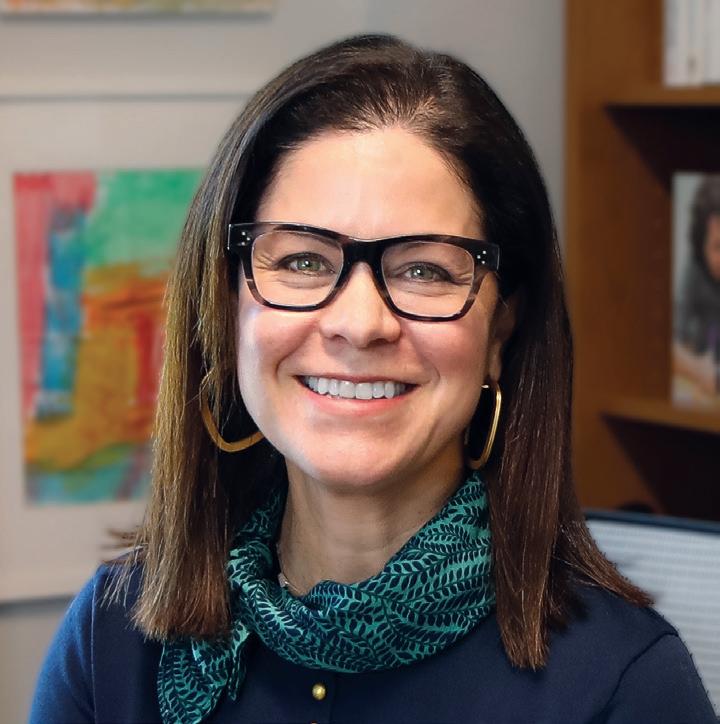
The other way we’re helping members tell their district’s story and advocate on behalf of their students and staff is through our new Local Legislative Priorities tool, which will debut in January 2026.
Essentially, we’re creating a heat map that will allow us to collect and share local legislative priorities from across the state with our members via their Member Dashboard.
By next July, we’re planning to add a filter tool that will allow members to search by district and category. That means districts with similar legislative priorities will be able to connect on those issues to strengthen their grassroots advocacy efforts.
The goal behind all of these efforts is simple but powerful: Give our members more support to lead and govern in their communities. There is nothing more powerful than local voices working together on behalf of their students and families. Having the tools you need to tell your district’s story and make connections with other trustees in your regions and beyond will help amplify support for our public schools, change minds, and improve lives.
We hope you find these new tools useful and that you’ll let us know your feedback. With your help and the guidance of our Board, we’re going to continue to innovate and improve on how we serve you — our members.
We know our success as an Association starts and ends with you, and we’re excited about the future.H
Tiffany Dunne-Oldfield is TASB’s deputy executive director.

Texas Association of School Boards
P.O. Box 400
Austin, Texas 78767-0400

» Thursday, Nov. 6, 2025
Abilene - Region 14 ESC North Campus
» Thursday, Nov. 13, 2025
San Marcos - Embassy Suites
» Saturday, Nov. 15, 2025
South Padre Island - Hilton Garden Inn South Padre Island Beachfront
» Tuesday, Nov. 18, 2025
Tyler - Marriott Courtyard
» Wednesday, Nov. 19, 2025
Waco - Cambria Hotel Waco University Riverfront